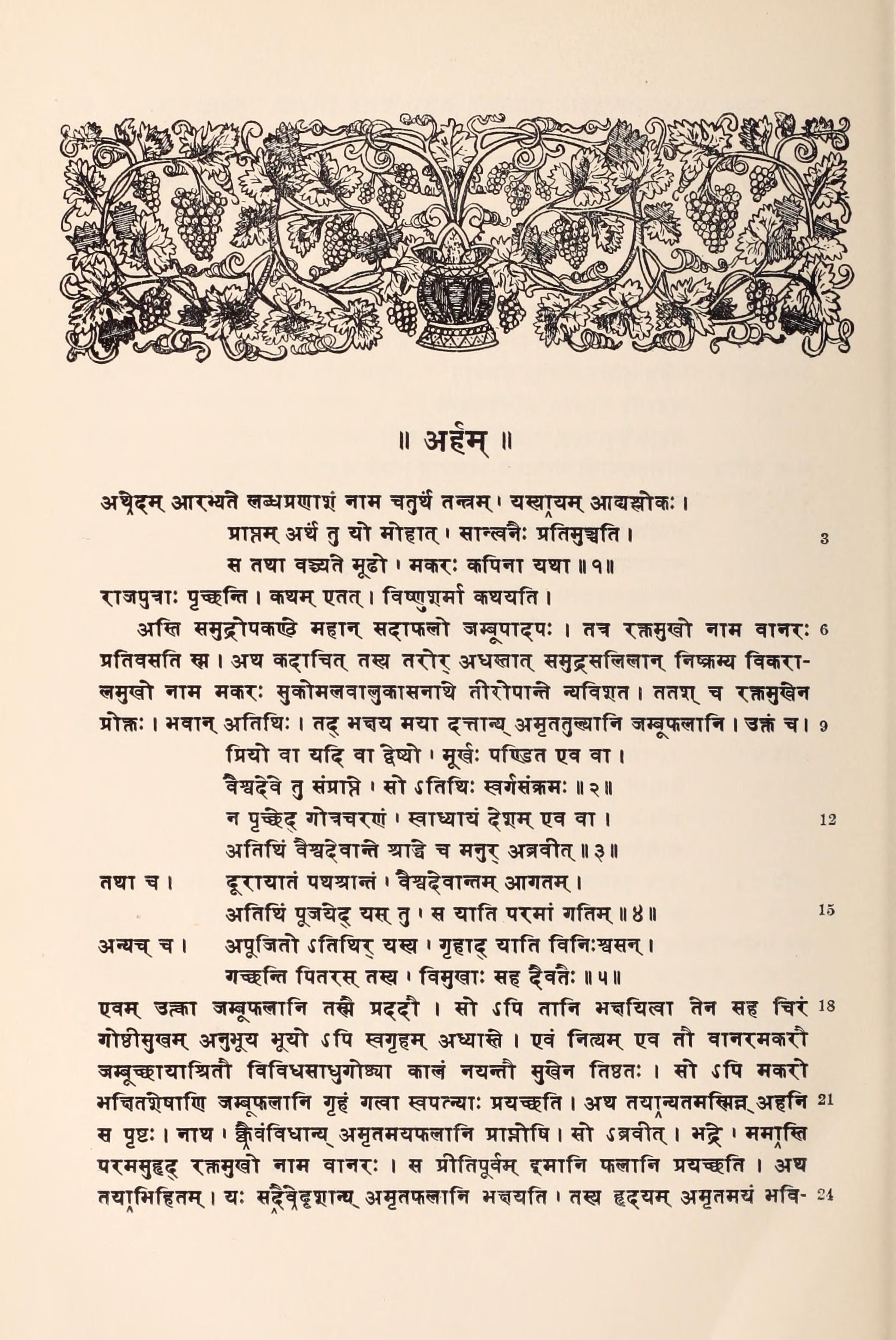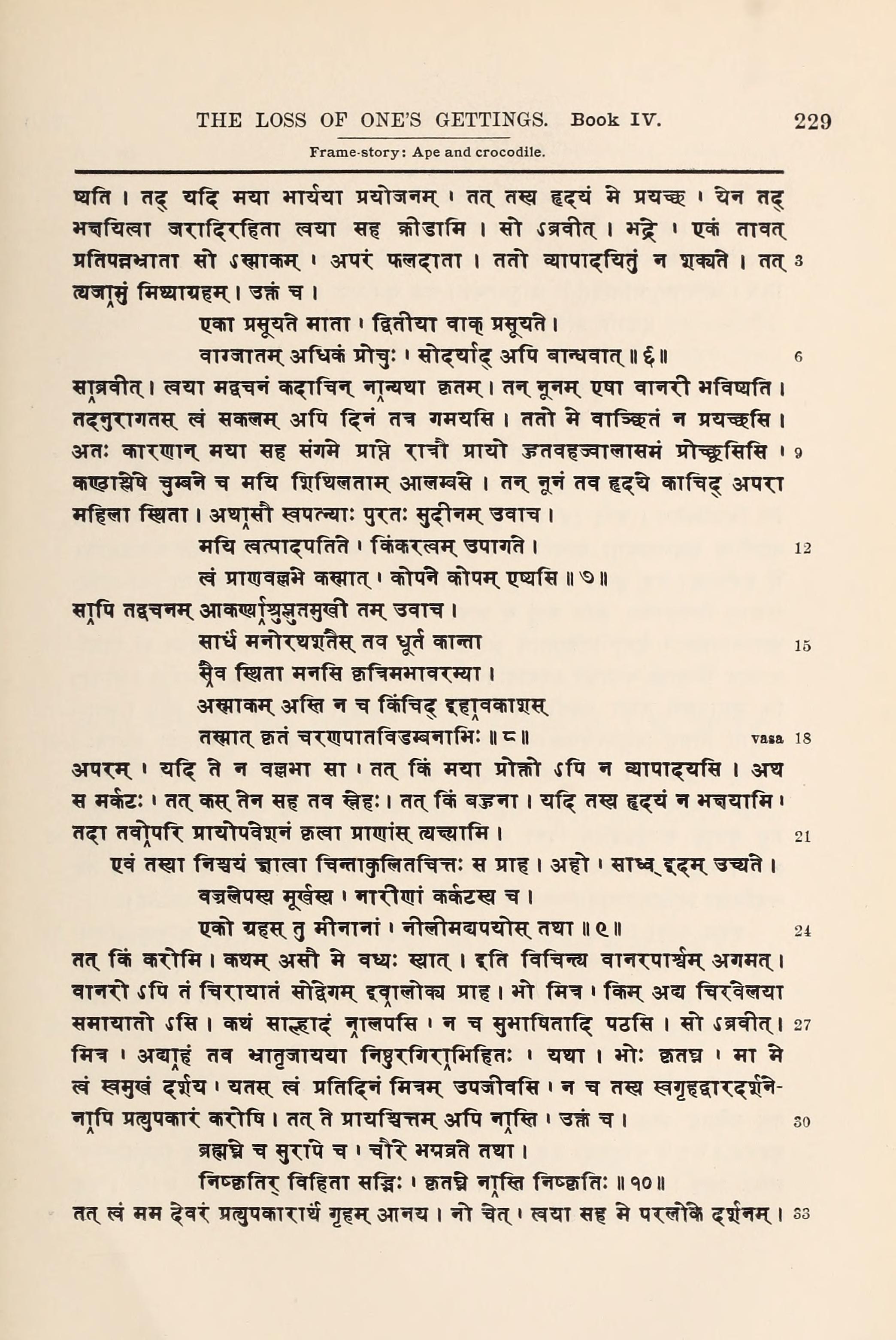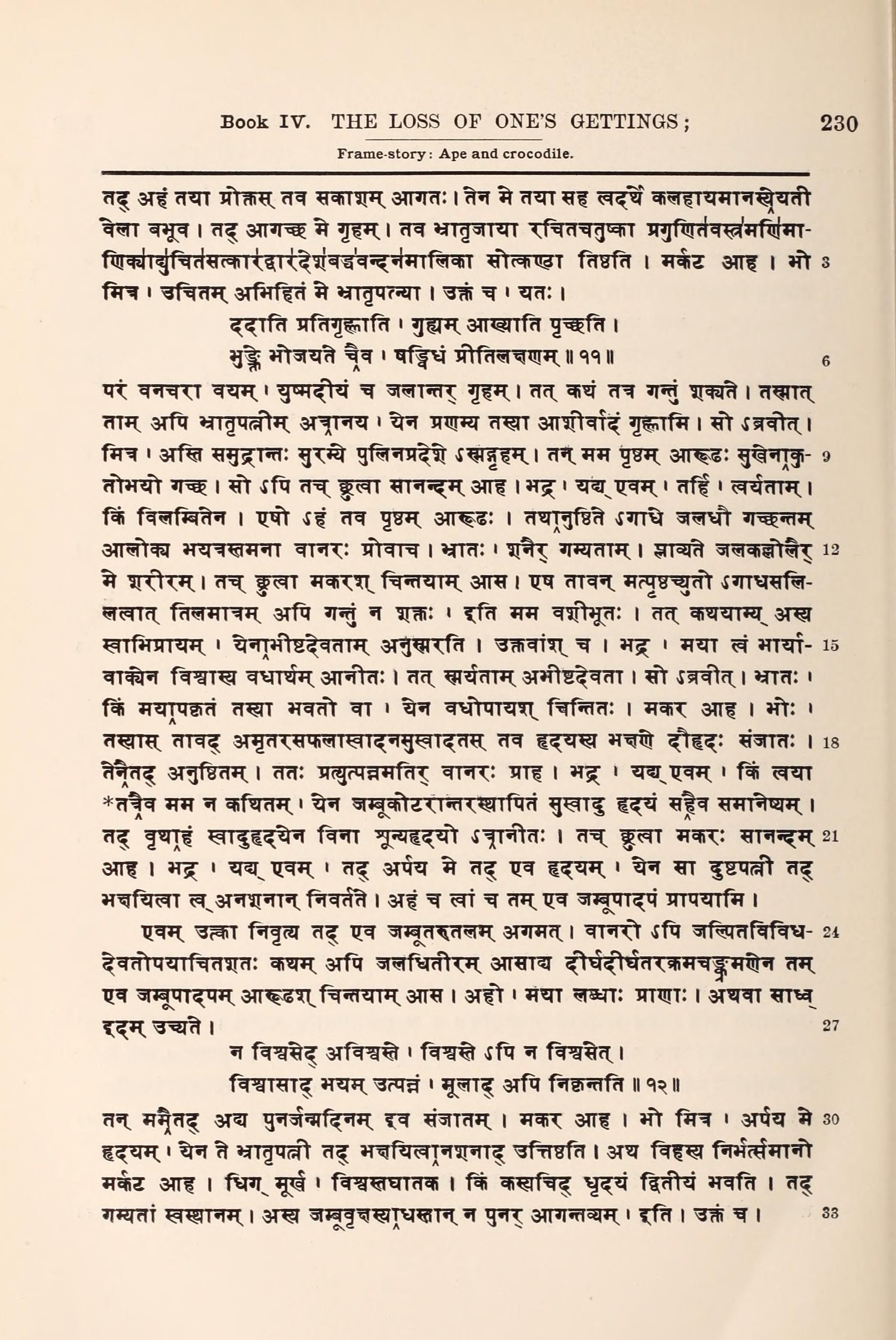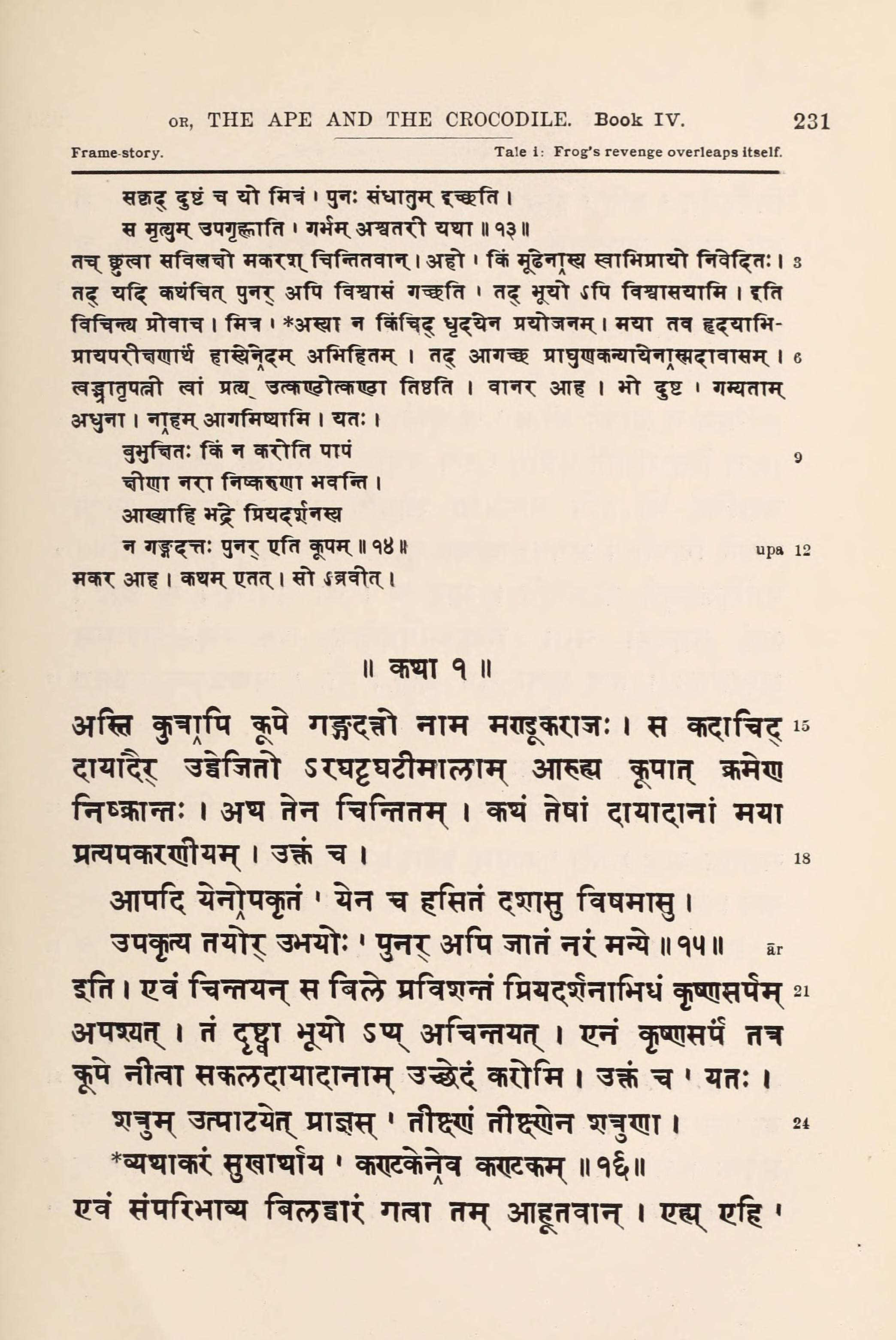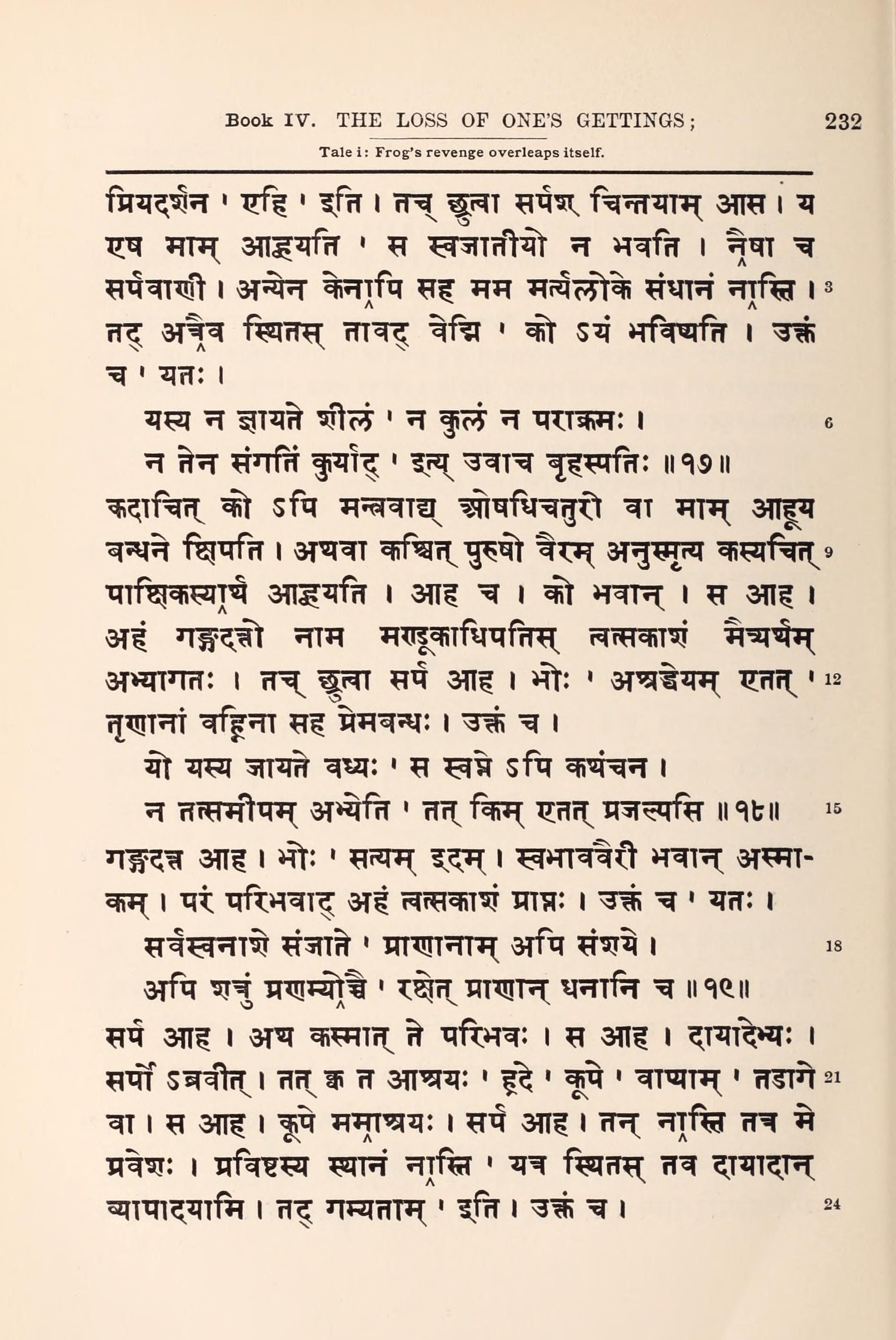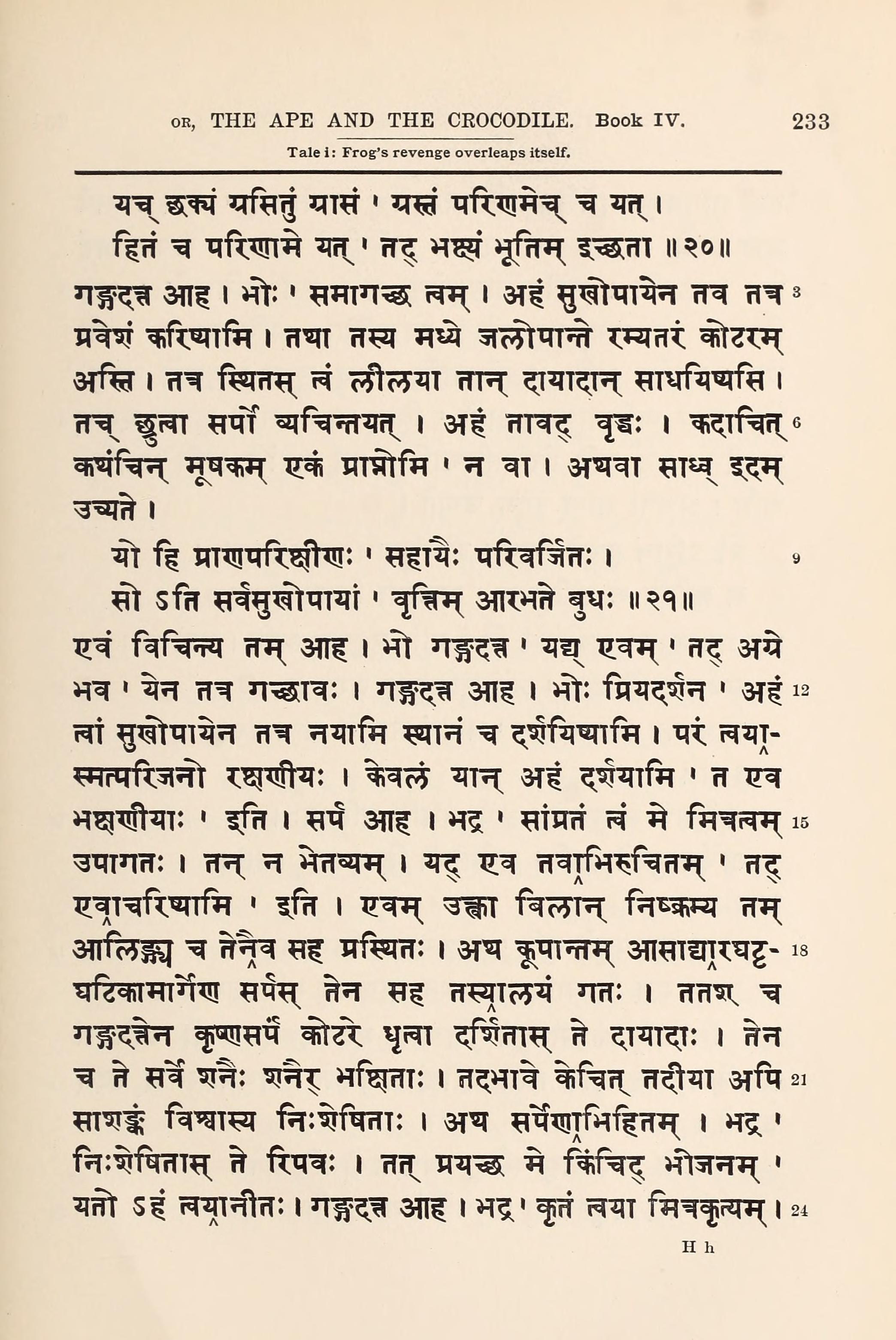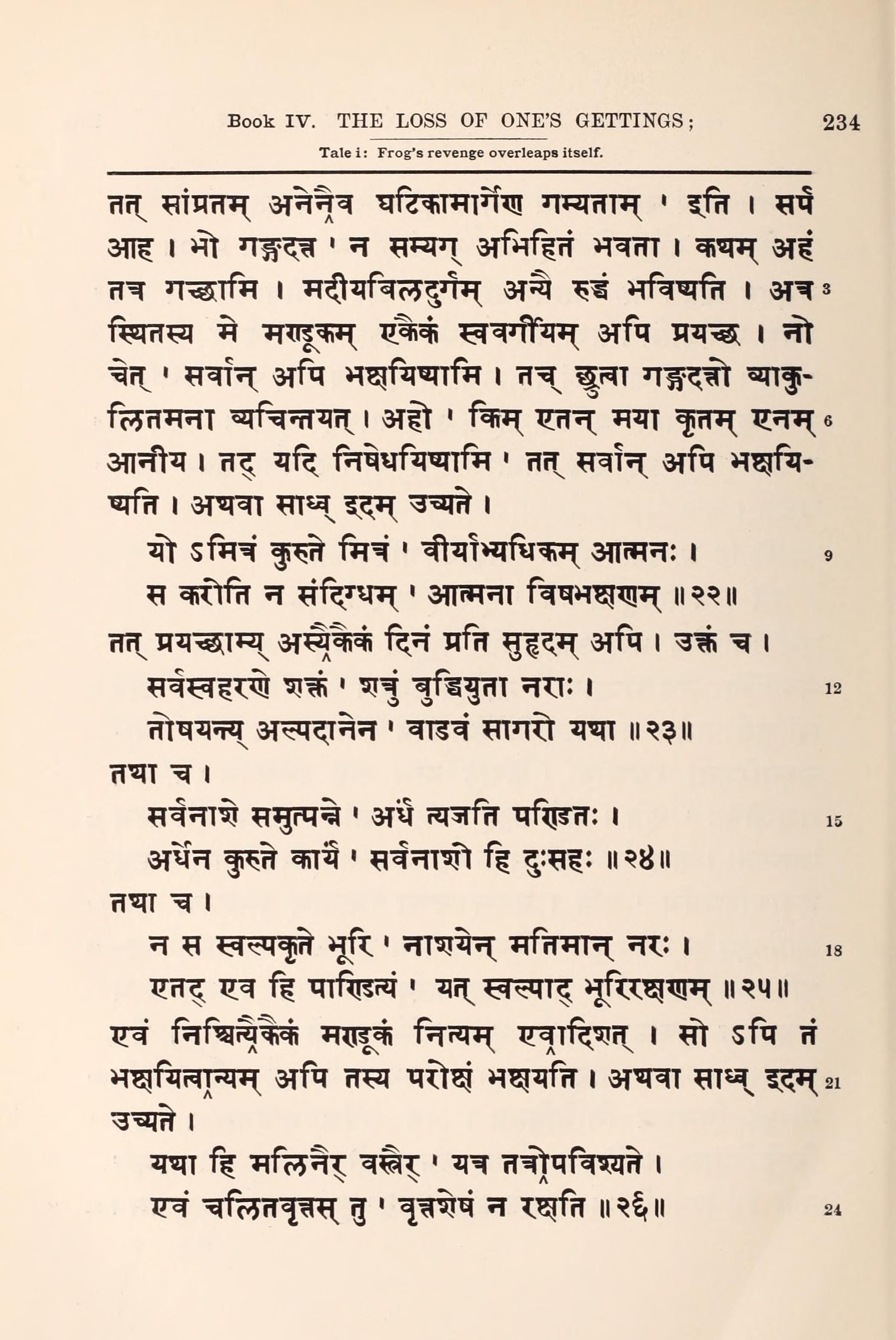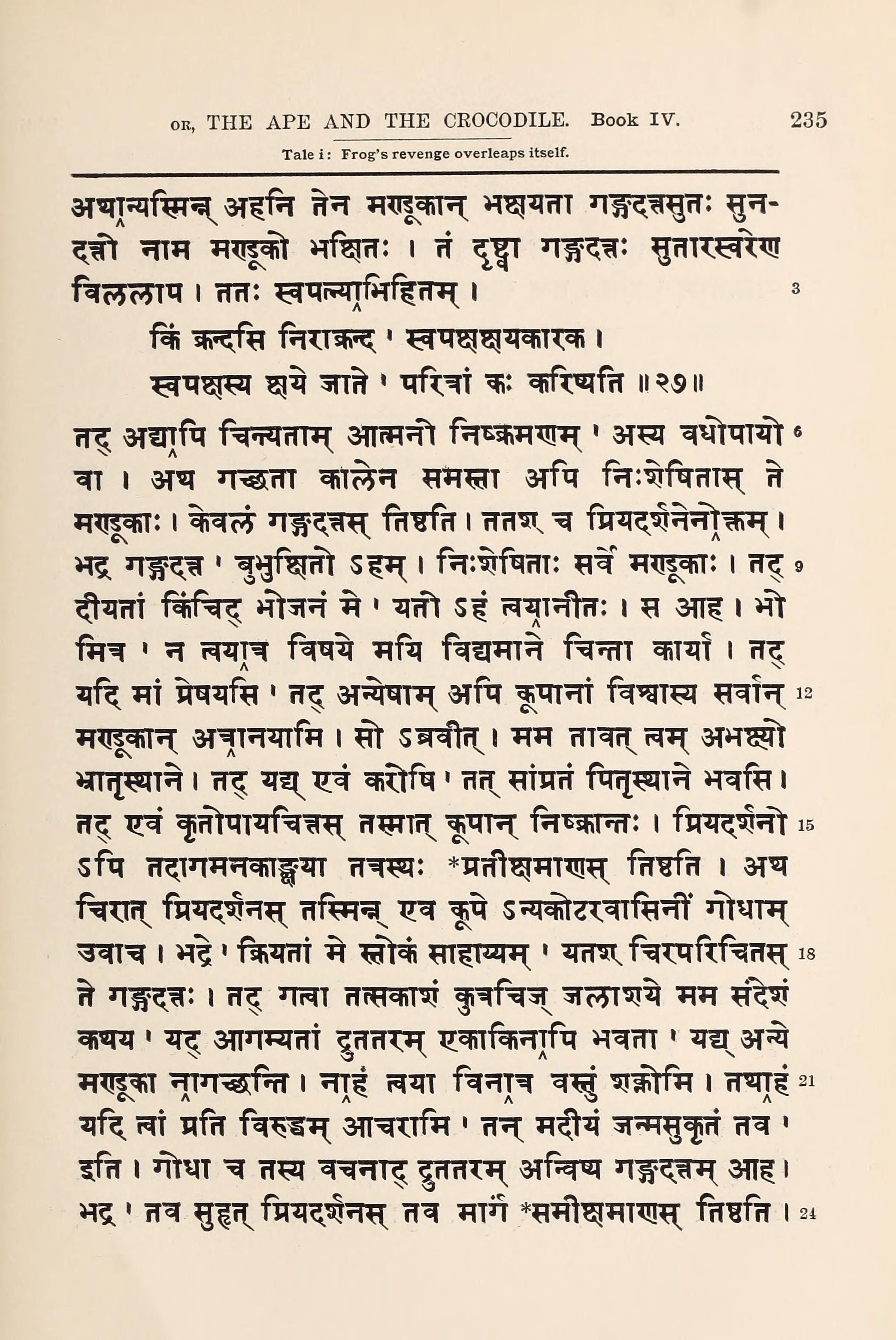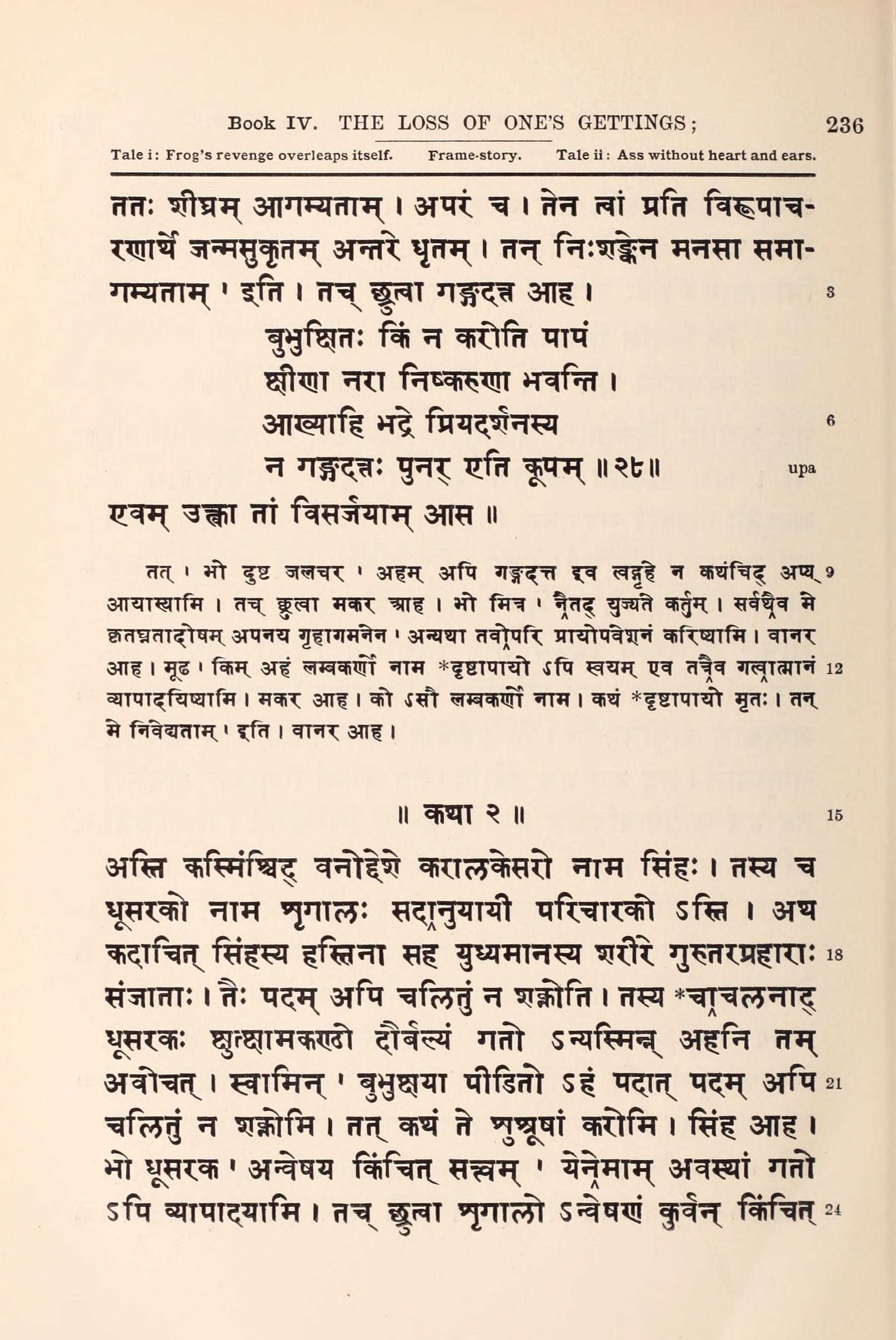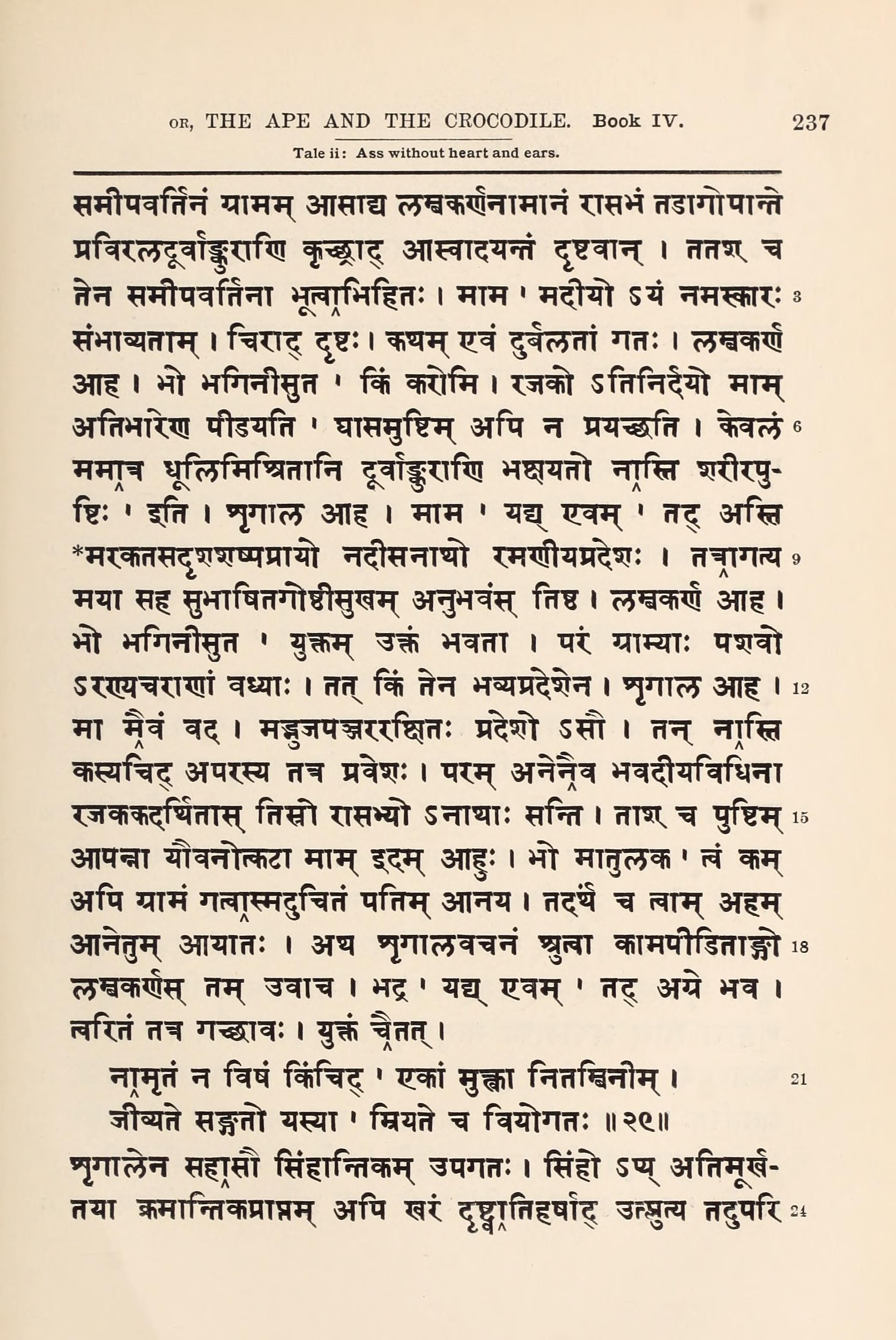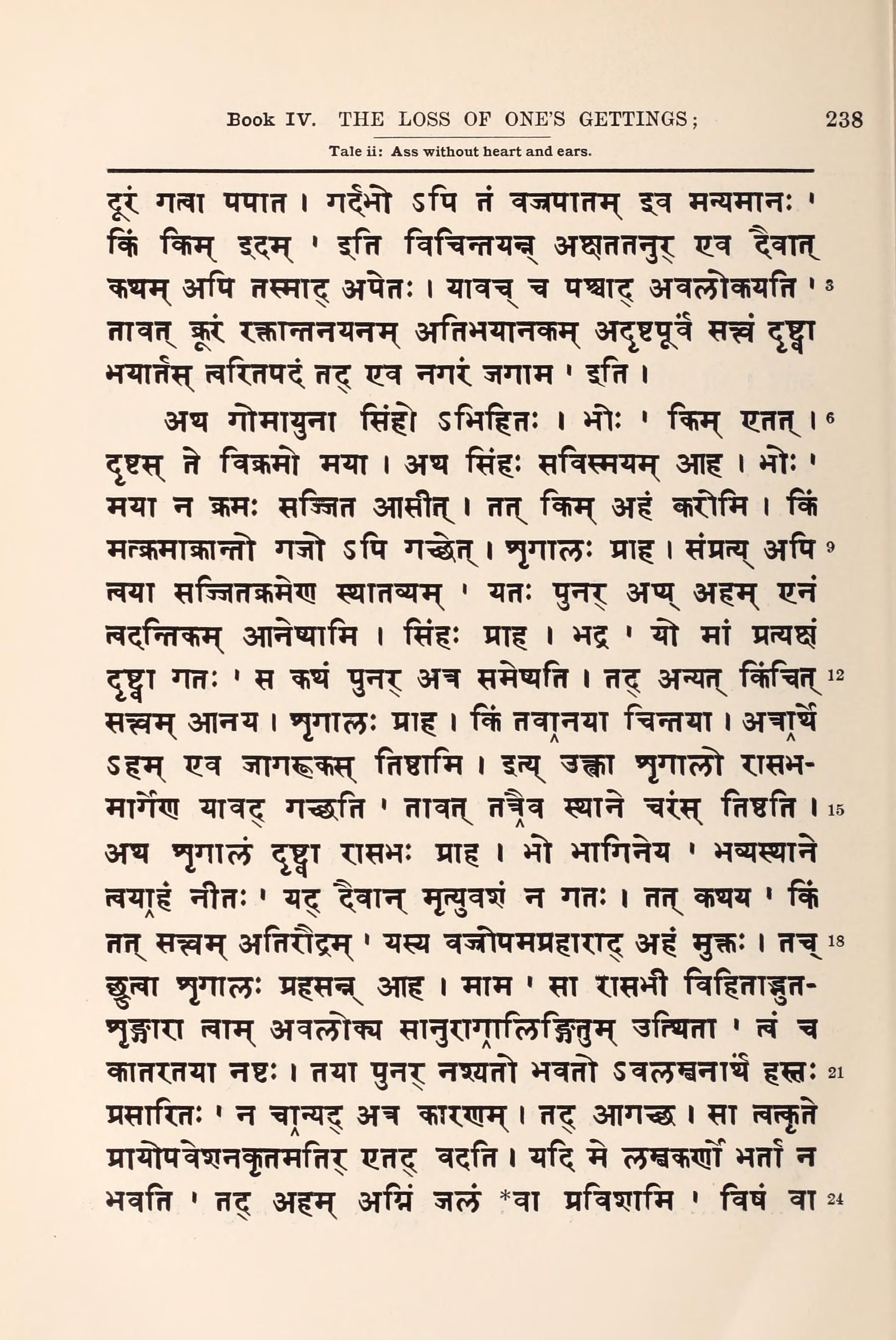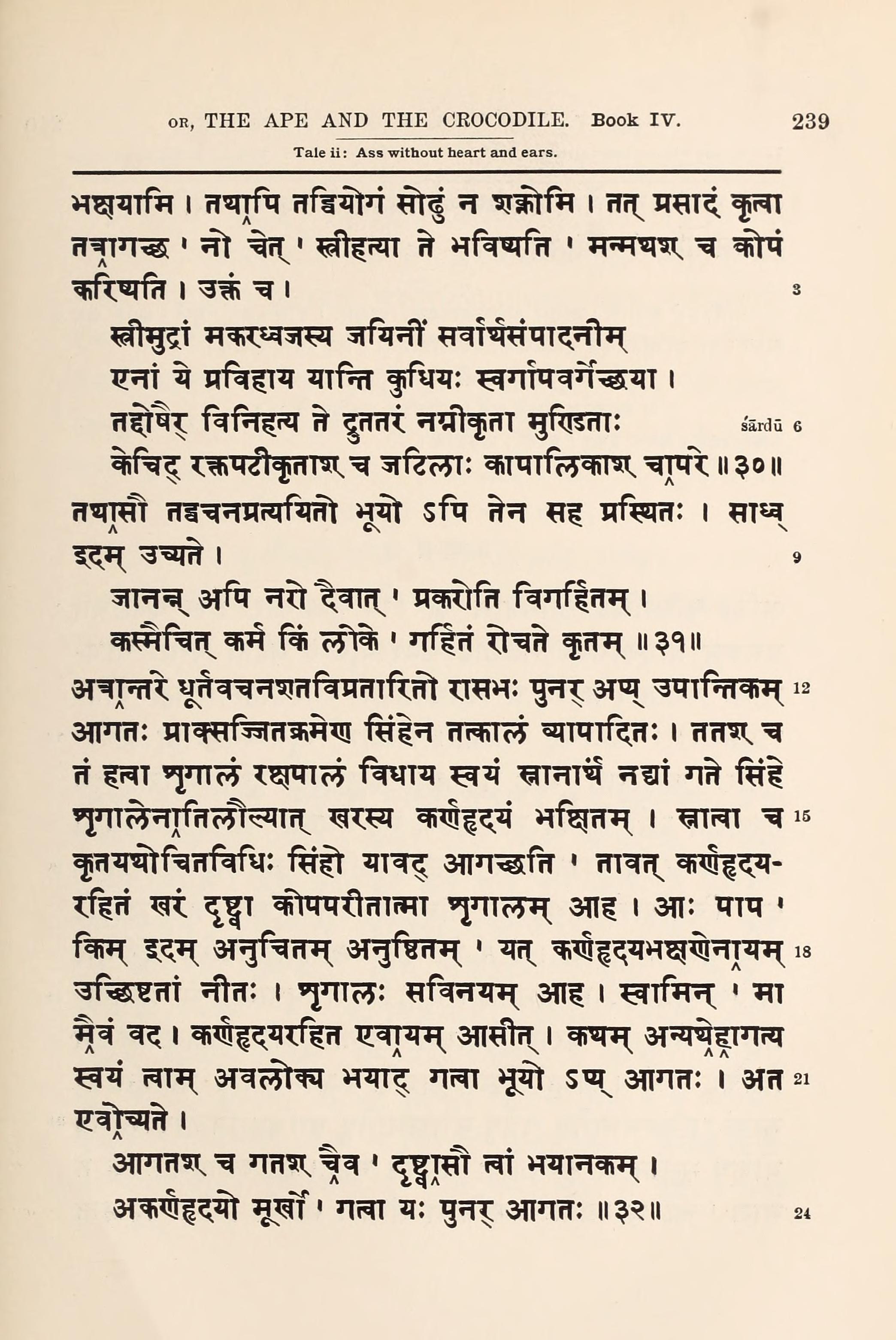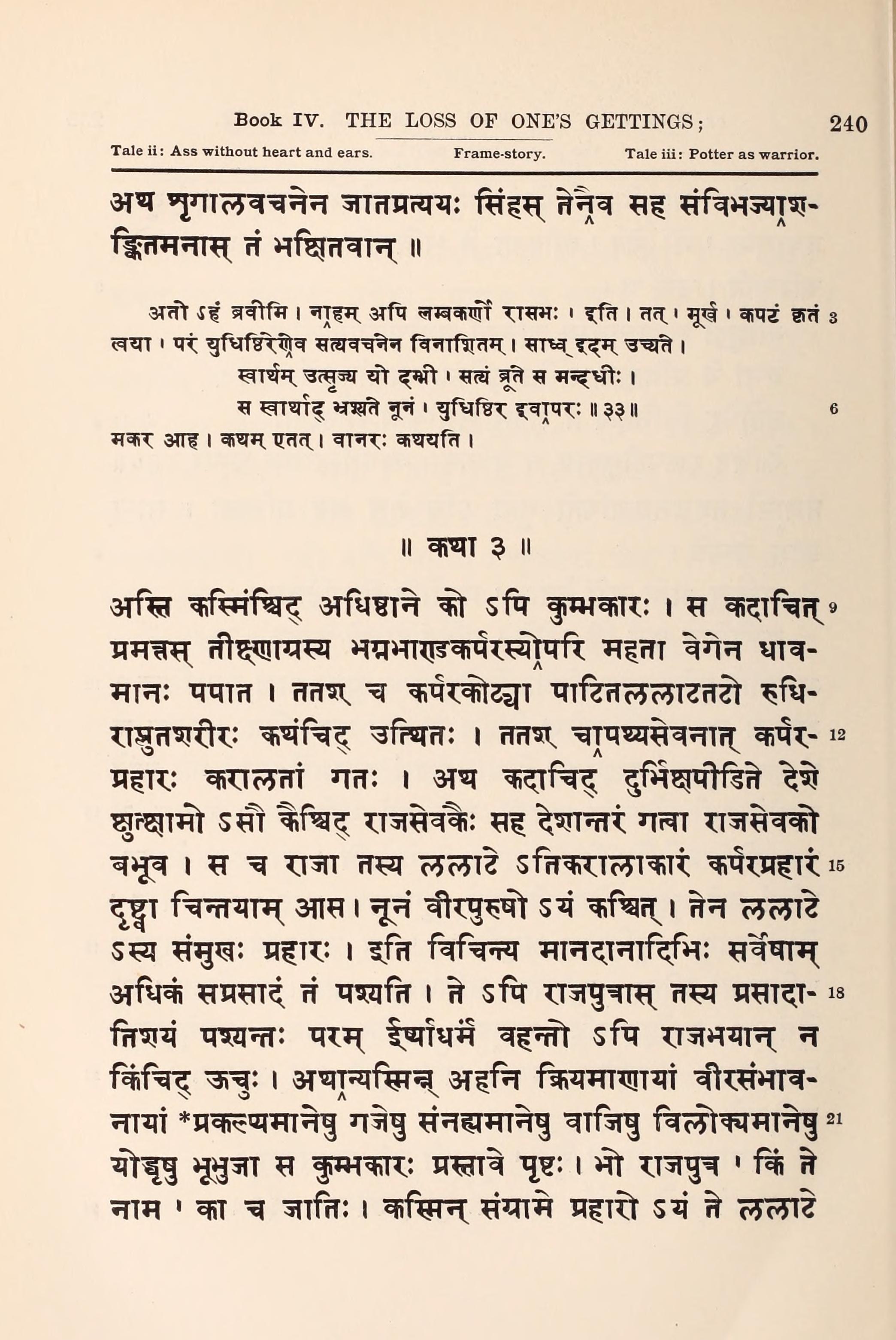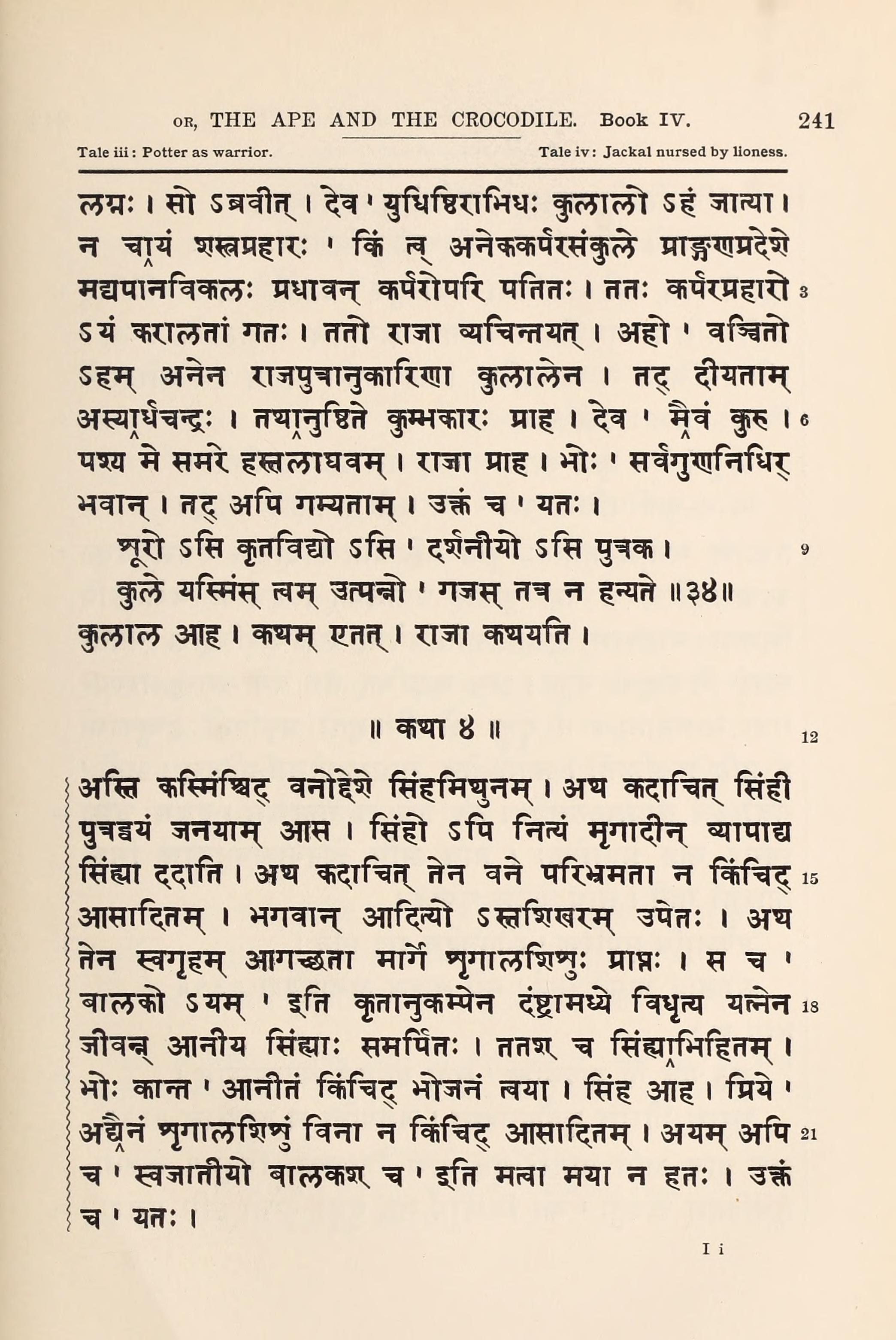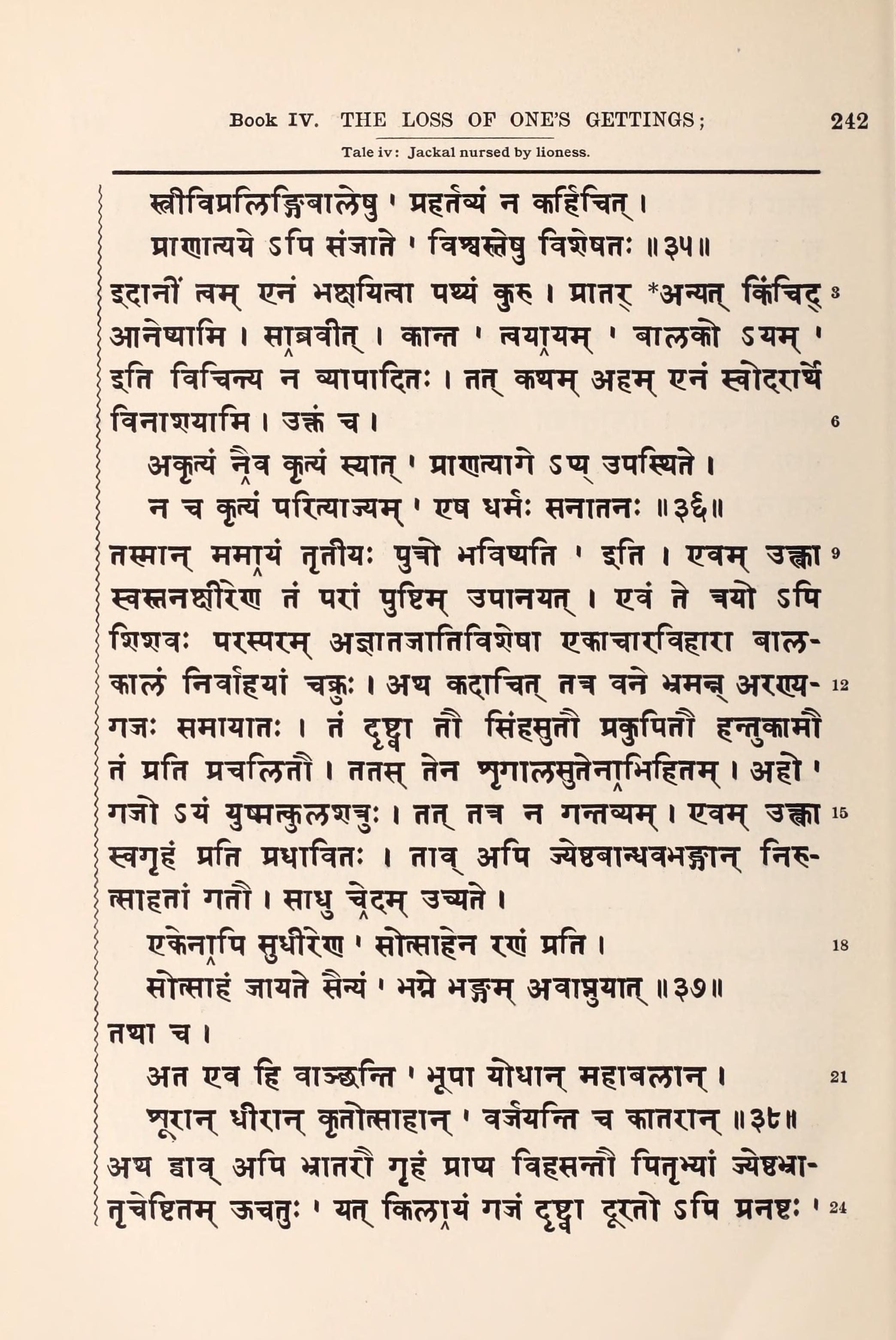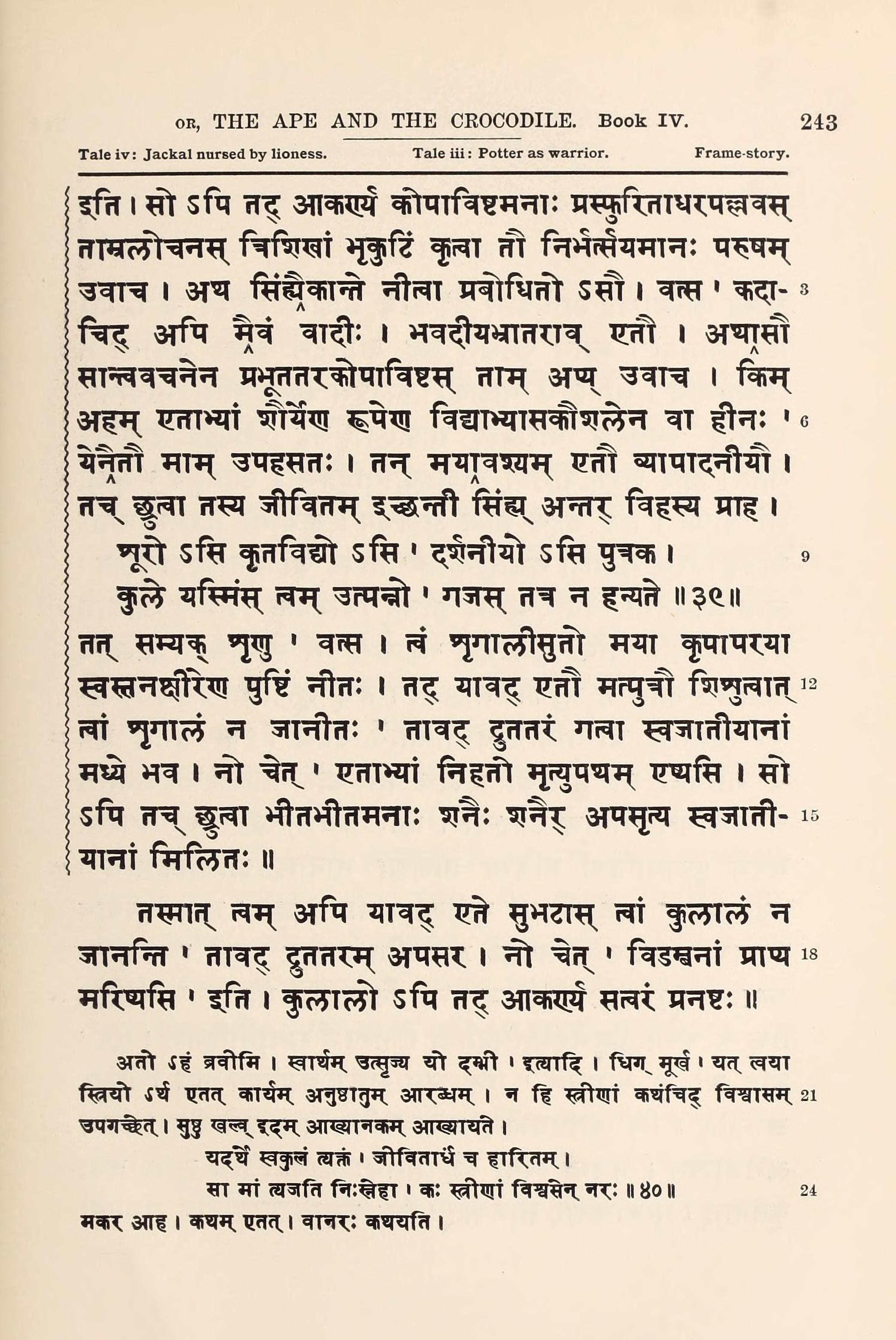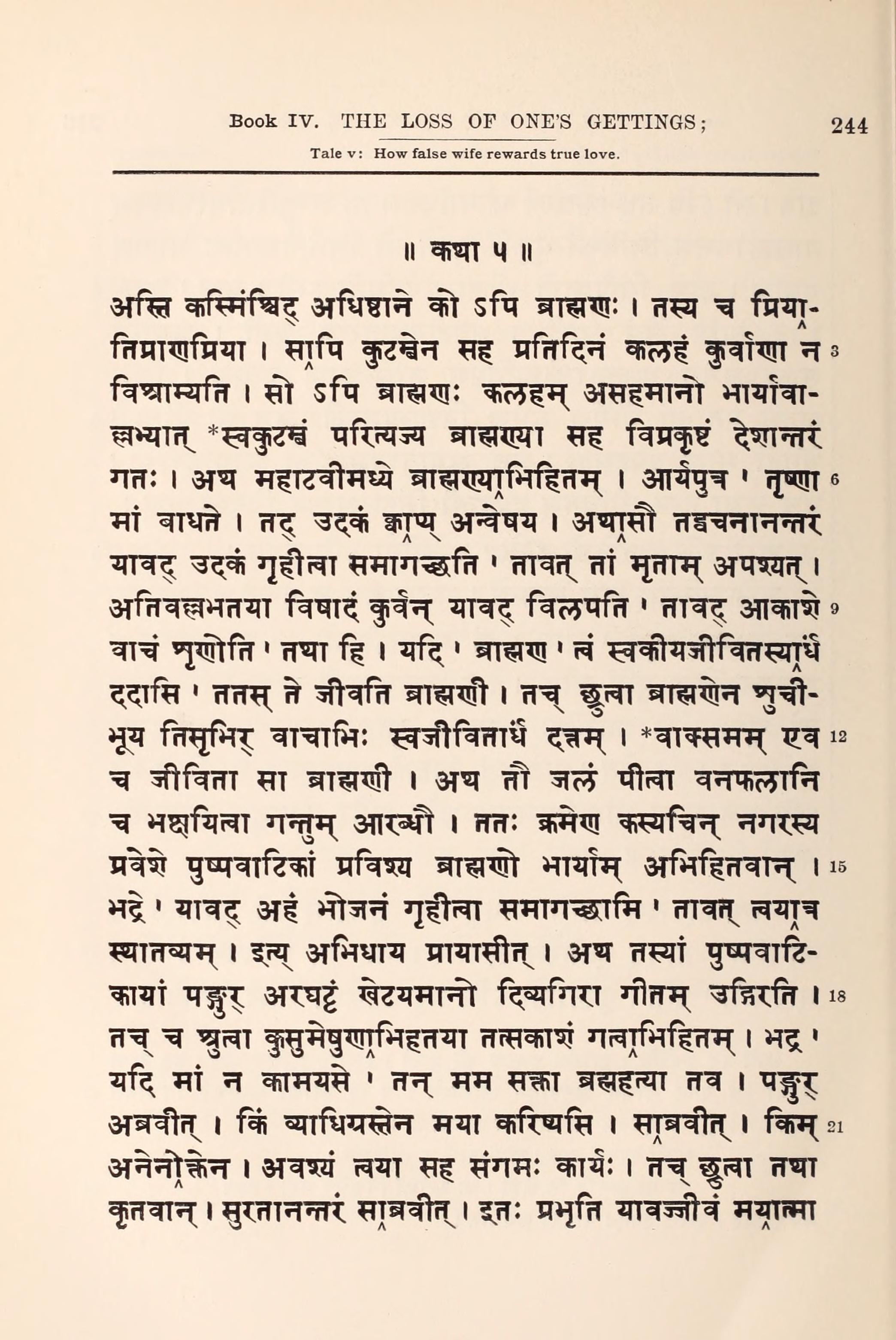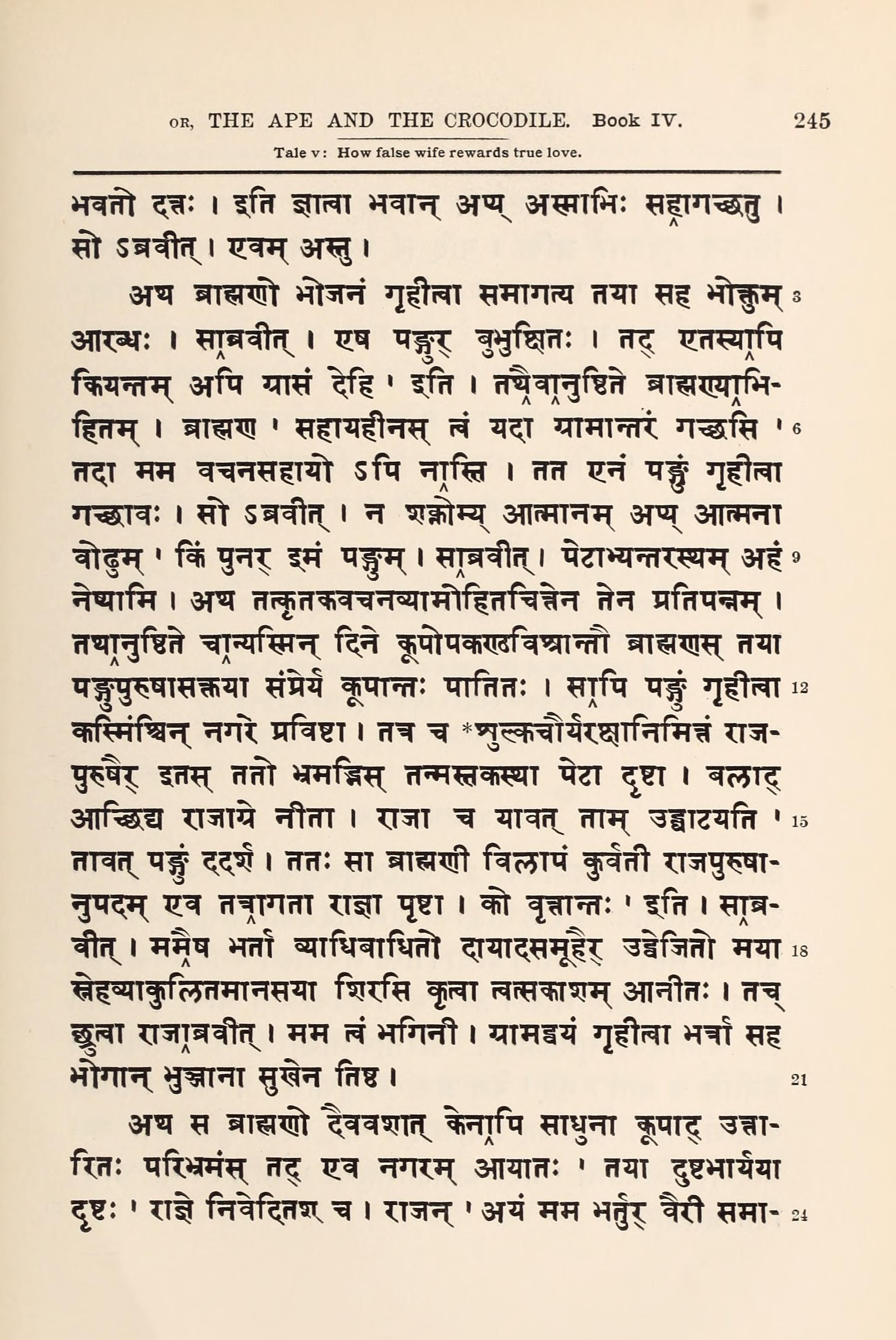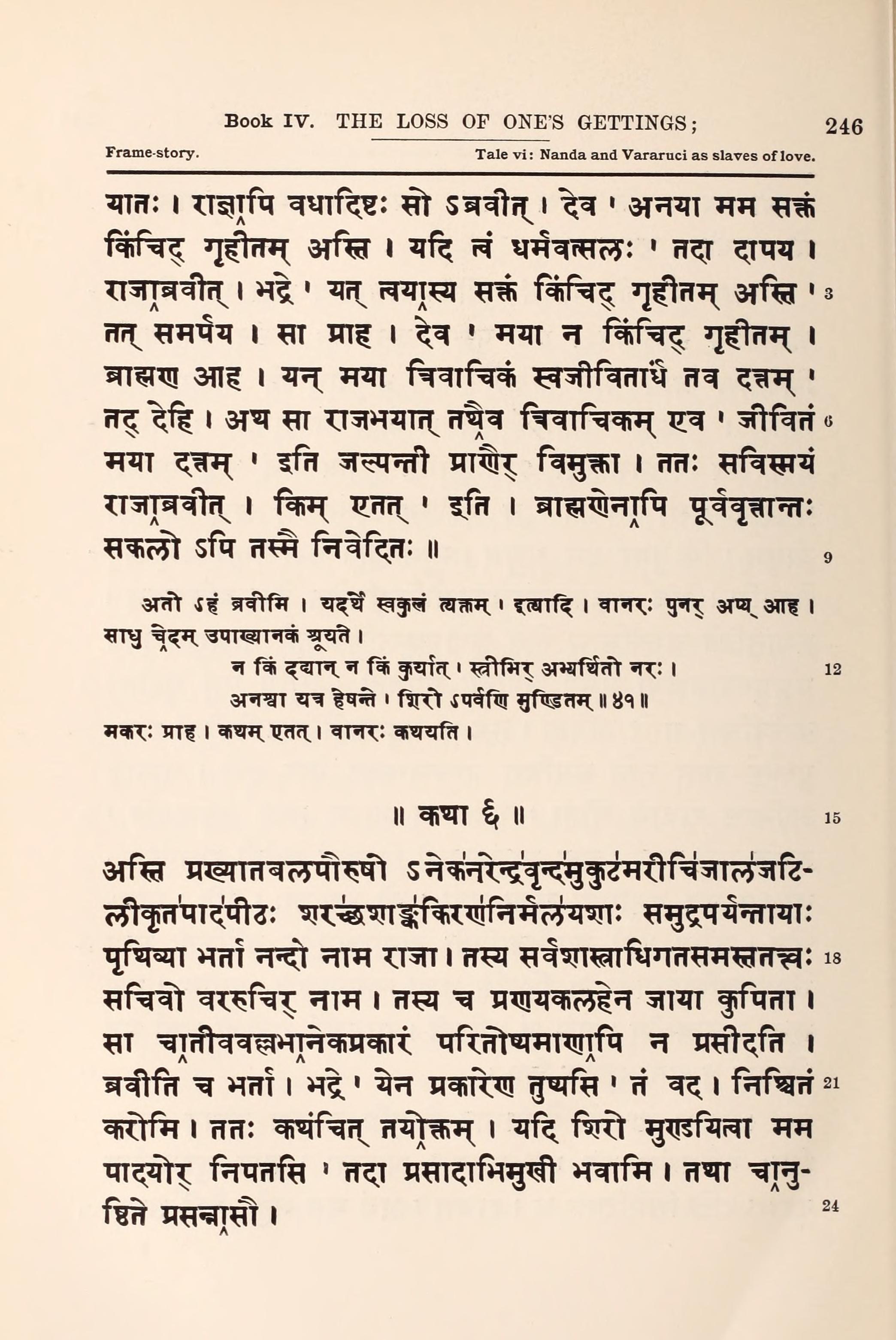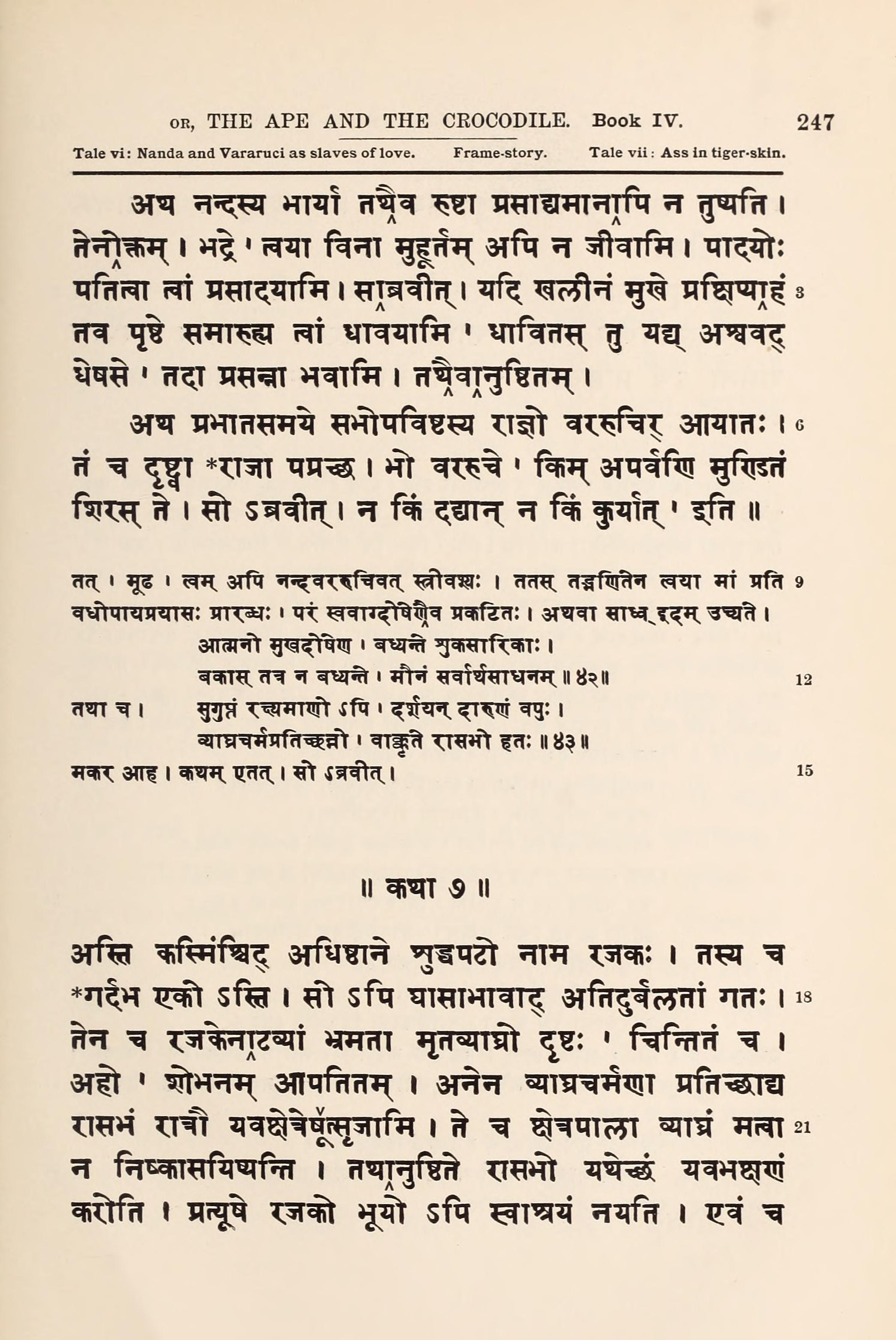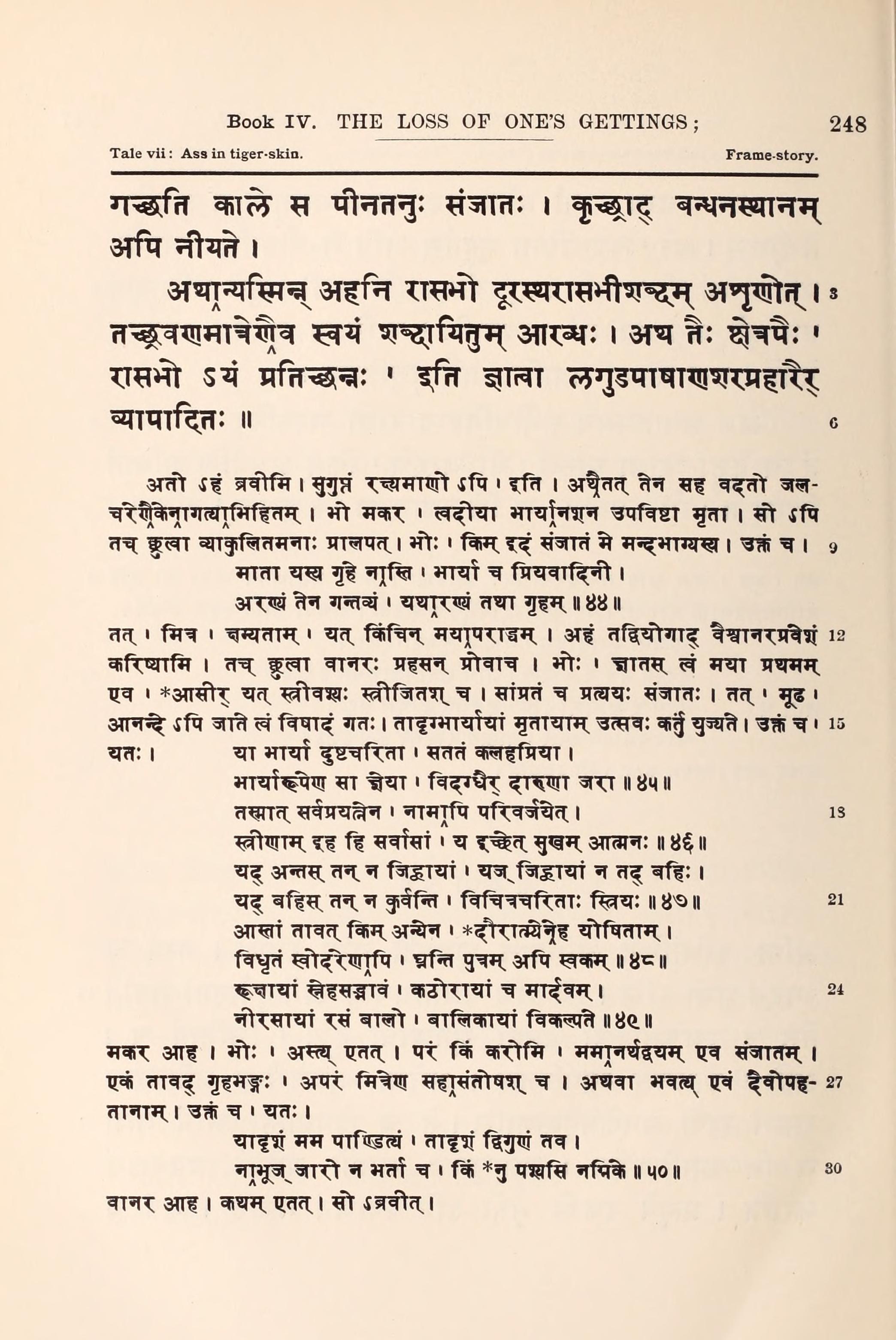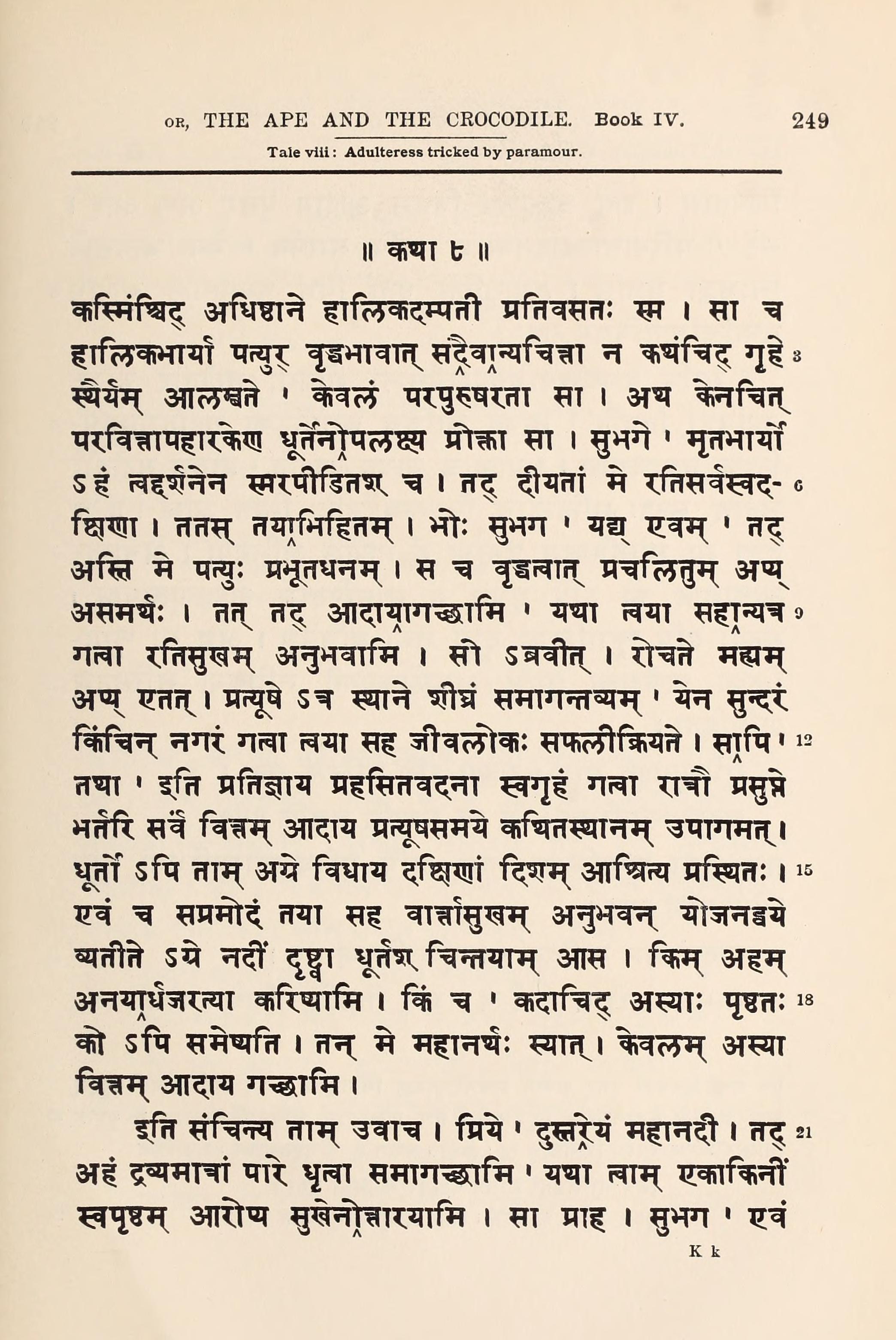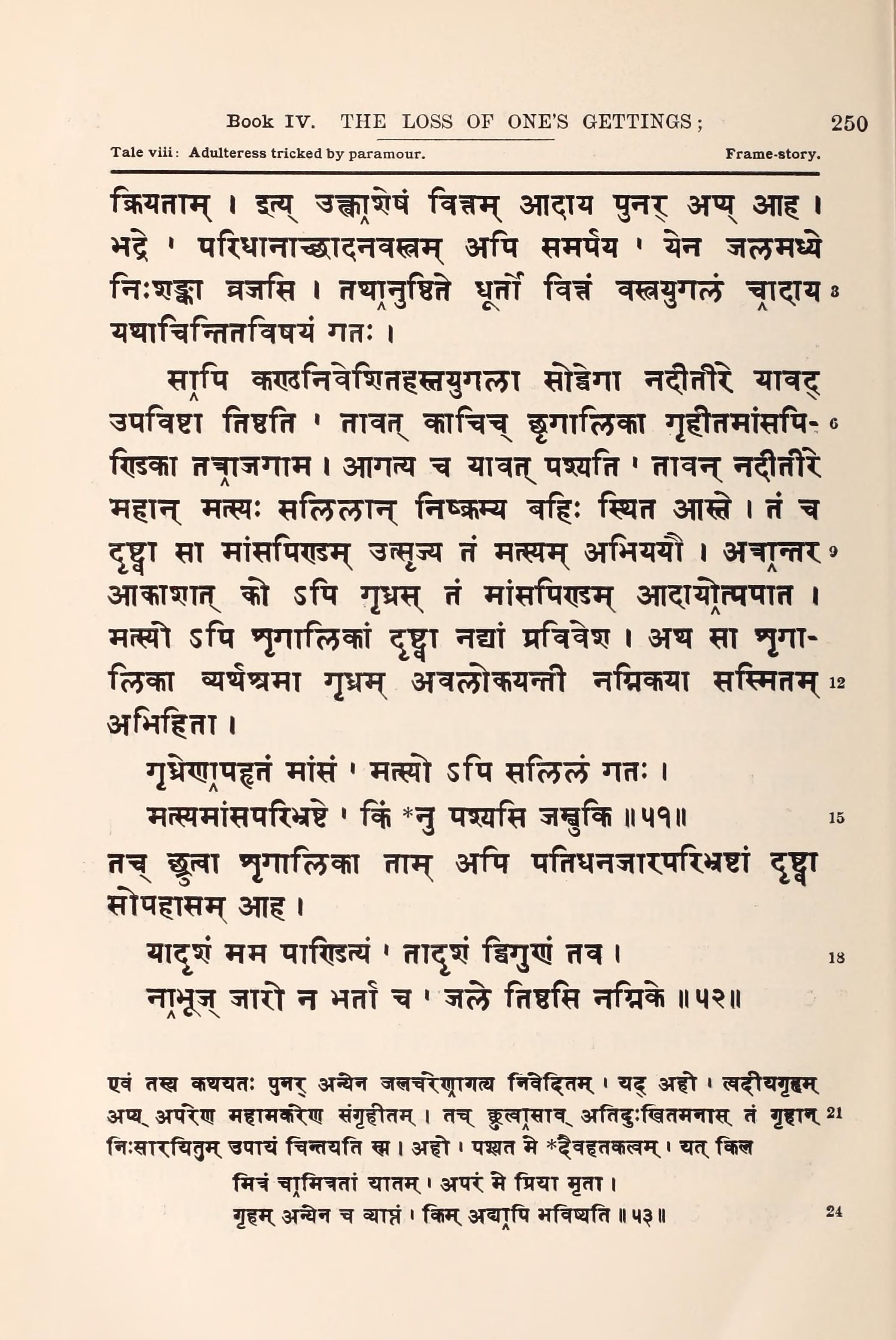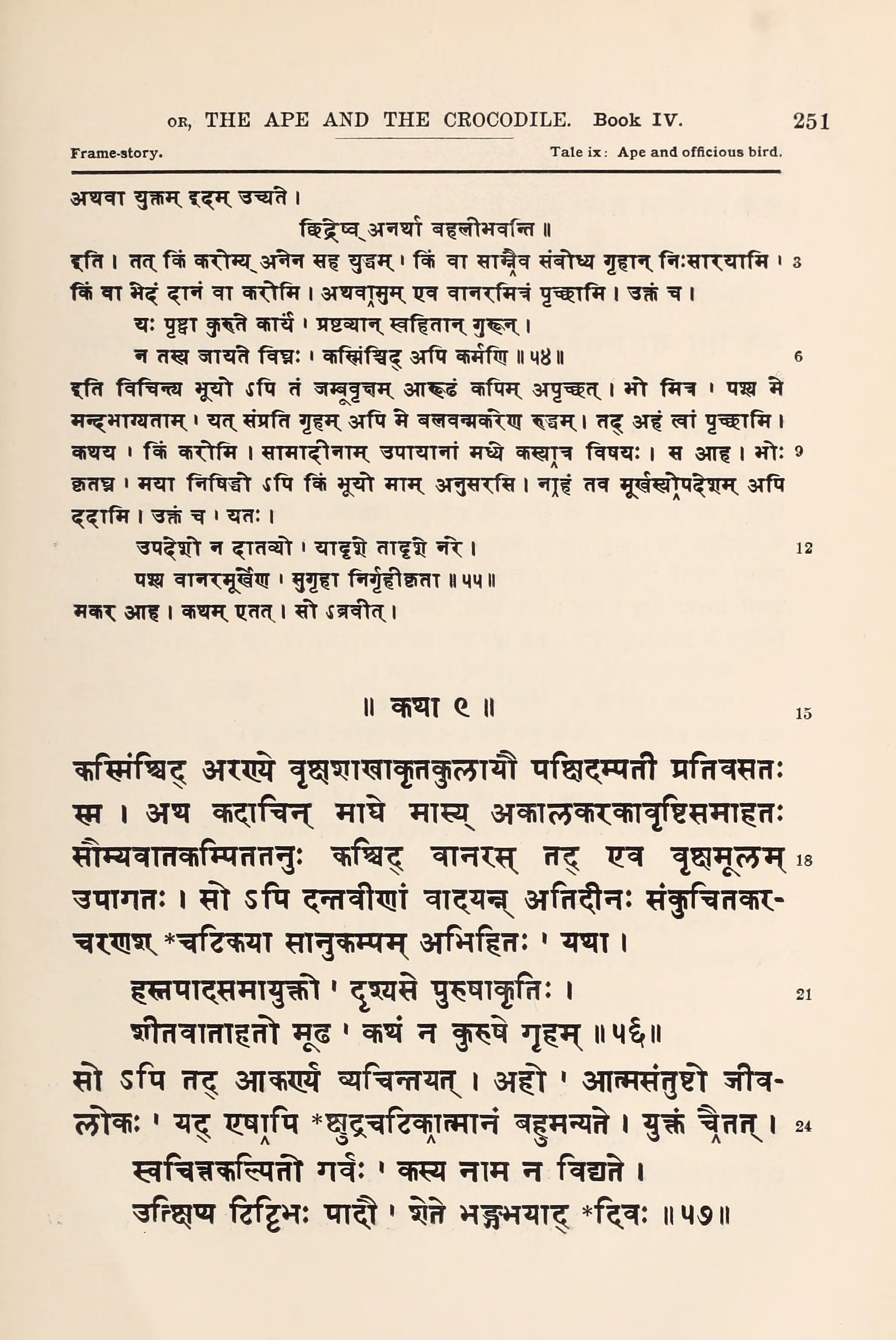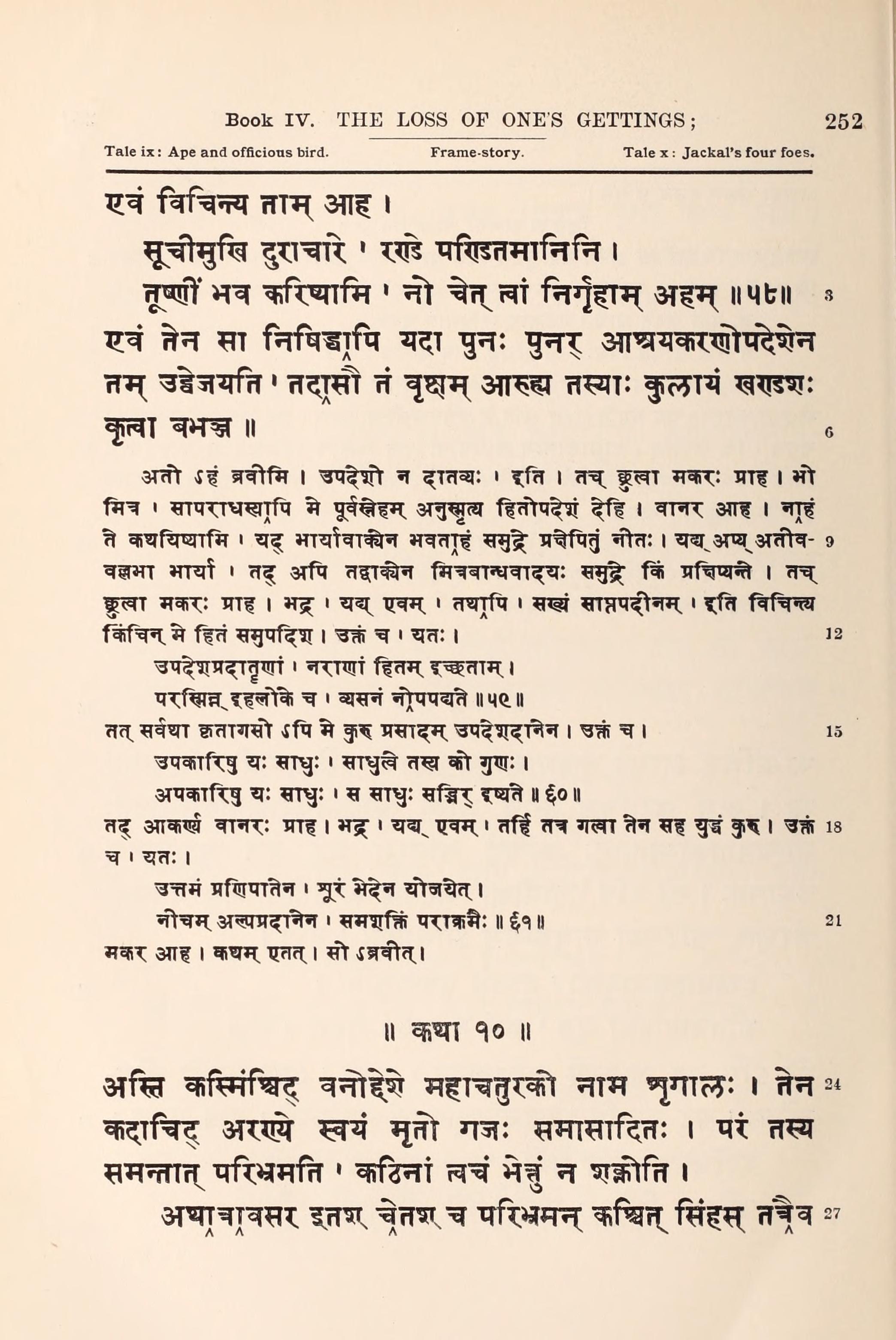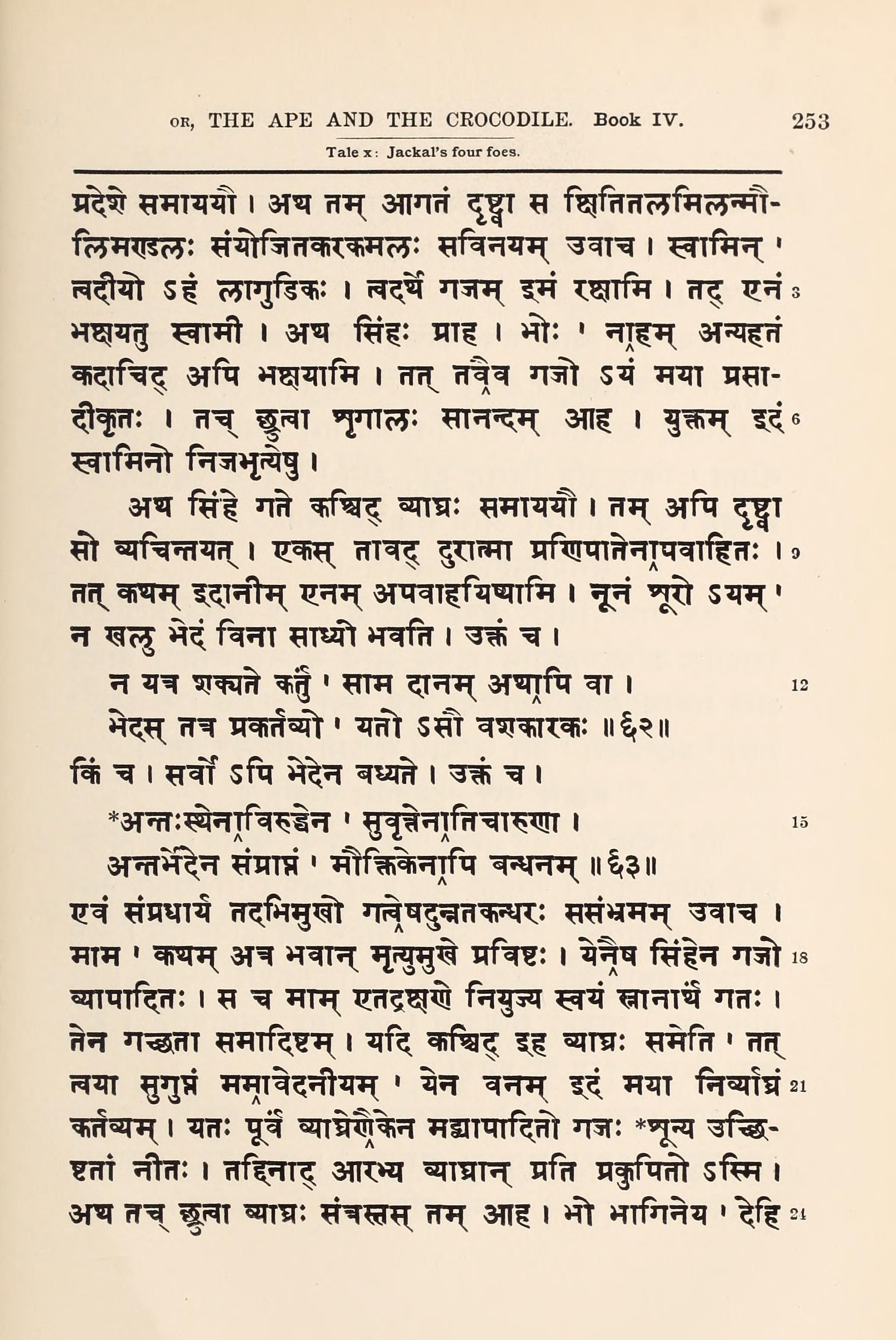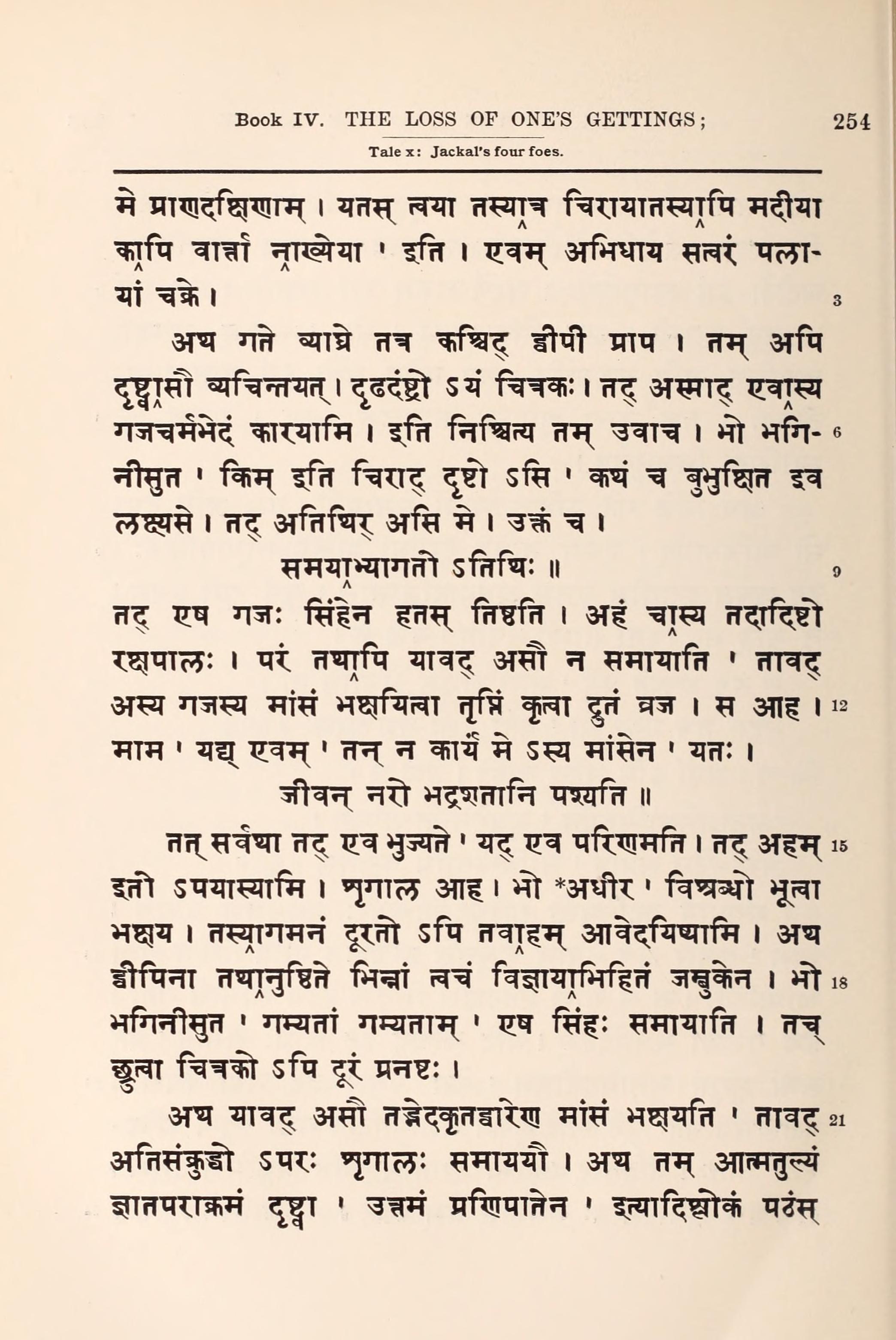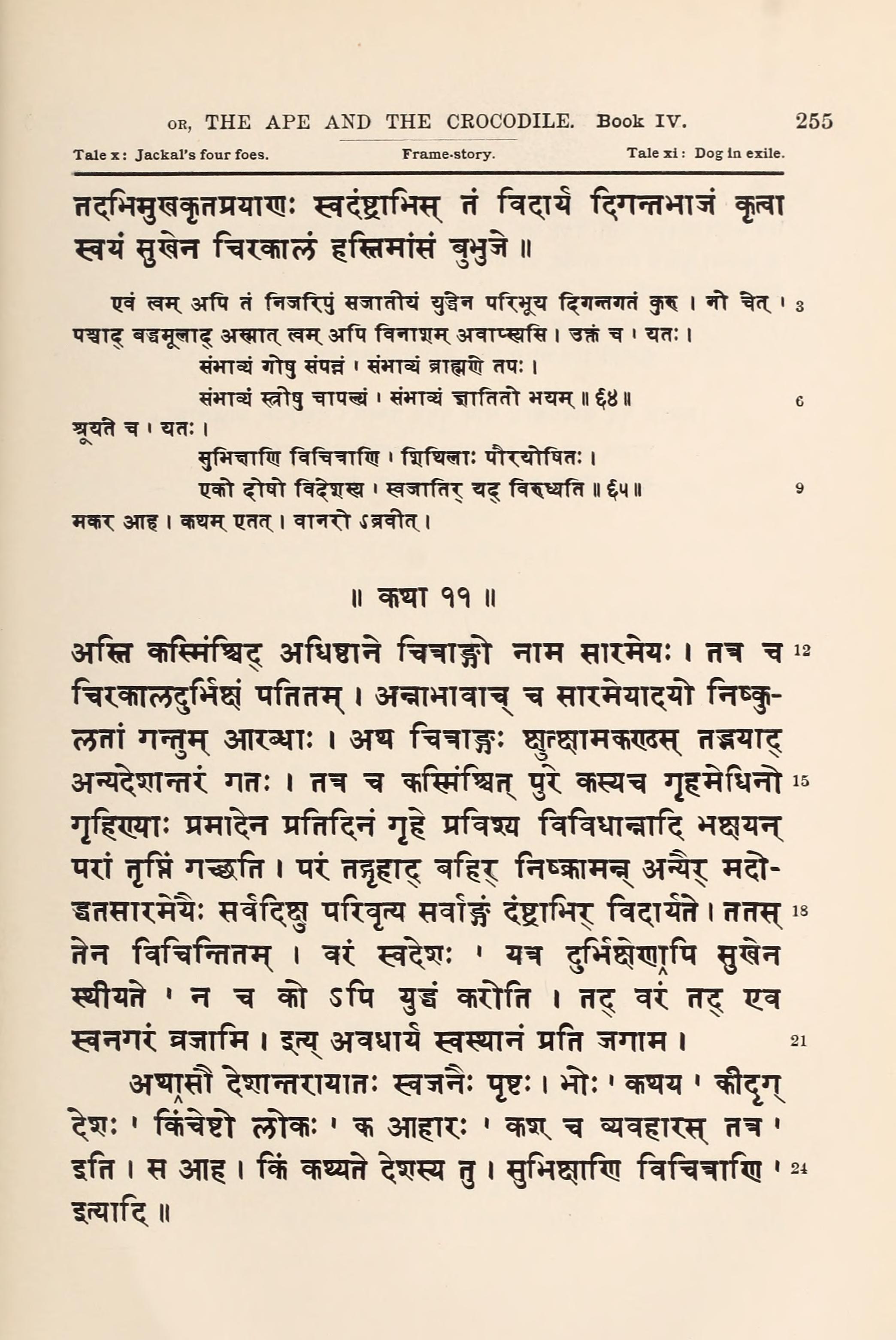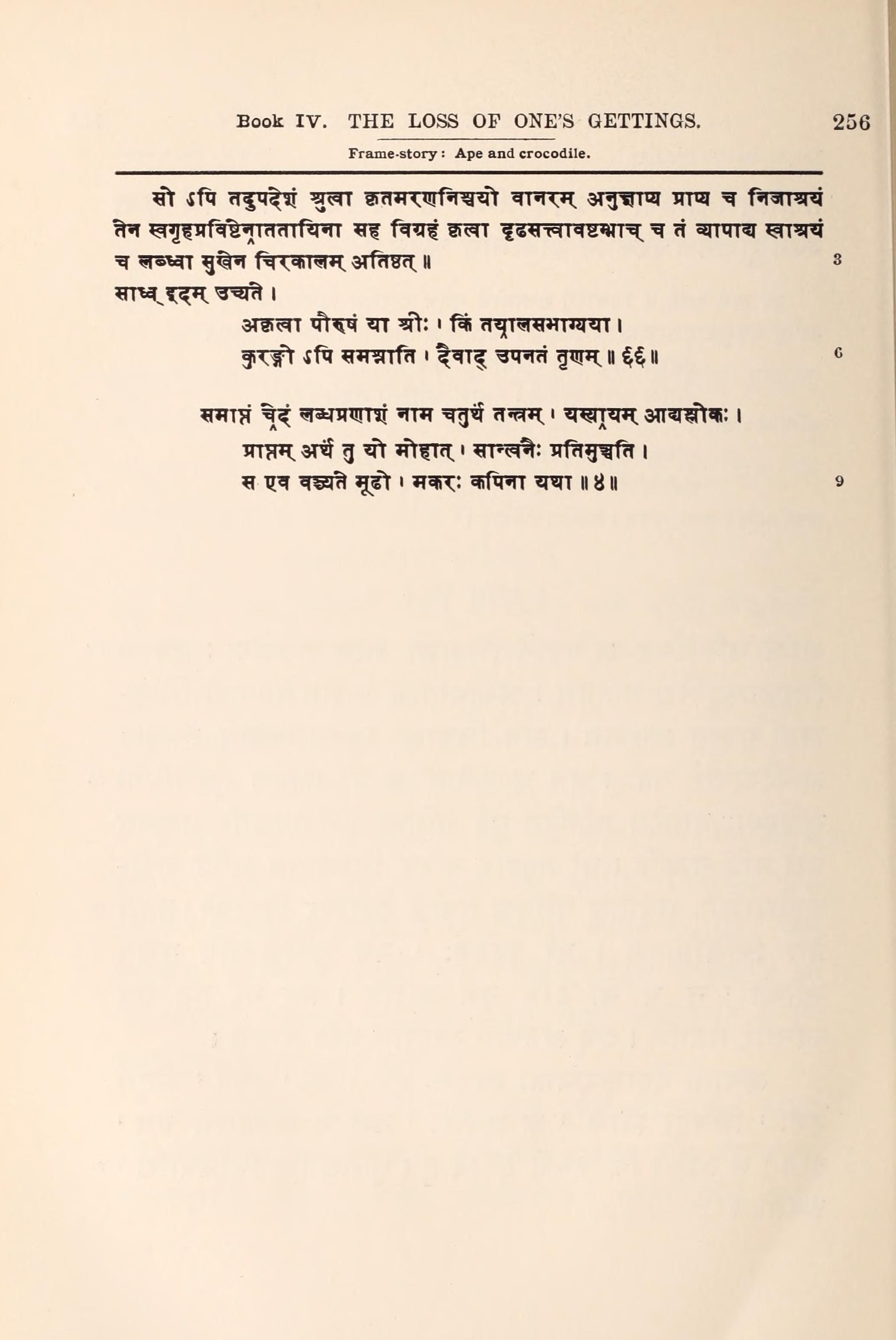Here, then, begins Book IV, called “Loss of Gains.” The first verse runs:
Blind folly always has to pay For giving property away Because of blandishments and guile— The monkey tricked the crocodile.
“How was that?” asked the princes. And Vishnusharman told the story of
The Monkey and the Crocodile
On the shore of the sea was a great rose-apple tree that was never without fruit. In it lived a monkey named Red-Face.
Now one day a crocodile named Ugly-Mug crawled out of the ocean under the tree and burrowed in the soft sand. Then Red-Face said: “You are my guest, sir. Pray eat these rose-apples which I throw you. You will find them like nectar. You know the proverb:
A fool or scholar let him be, Pleasant or hideous to see, A guest, when offerings are given, Is useful as a bridge to heaven. Ask not his home or education, His family or reputation, But offer thanks and sacrifice: For so prescribes the lawbook wise.
And again:
By honoring the guests who come Wayworn from some far-distant home To share the sacrifice, you go The noblest way that mortals know.
And once again:
If guests unhonored leave your door, And sadly sighing come no more, Your fathers and the gods above Turn from you and forget their love.”
Thus he spoke and offered rose-apples. And the crocodile ate them and enjoyed a long and pleasant conversation with the monkey before returning to his home. So the monkey and the crocodile rested each day in the shade of the rose-apple tree. They spent the time in cheerful conversation on various subjects, and were happy.
Now the crocodile went home and gave his wife the rose-apples which he had not eaten. And one day she asked him: “My dear husband, where do you get such fruits? They are like nectar.”
“My dear,” he said, “I have an awfully good friend, a monkey named Red-Face. He gives me these fruits in the most courteous manner.”
Then she said: “If anyone eats such nectar fruit every
day, his heart must be turned to nectar. So, if you value your wife, give me his heart, and I will eat it. Then I shall never grow old or sick, but will be a delightful companion for you.”
But he objected: “In the first place, my dear, he is our adopted brother. Secondly, he gives us fruit. I cannot kill him. Please do not insist. Besides, there is a proverb:
To give us birth, we need a mother; For second birth we need another: And friendship's brothers seem by far More dear than natural brothers are.”
But she said: “You have never refused me before. So I am sure it is a she-monkey. You love her and spend the whole day with her. That is why you will not give me what I want. And when you meet me at night, your sighs are hot as a flame of fire. And when you hold me and kiss me, you do not hug me tight. I know some other woman has stolen into your heart.”
Then the crocodile was quite dejected, and said to his wife:
When I am at your feet And at your service, sweet, Why do you look at me With peevish jealousy?
But her face swam in tears when she heard him, and she said:
“You love her, you deceiver;
Your wishes never leave her;
Her pretty shamming steals upon your heart.
My rivalry is vain, sir;
And so I pray abstain, sir,
From service that is only tricky art.
“Besides, if you do not love her, why not kill her when I ask you? And if it is really a he-monkey, why should you love him? Enough! Unless I eat his heart, I shall starve myself to death in your house.”
Now when he saw how determined she was, he was distracted with anxiety, and said: “Ah, the proverb is right:
Remember that a single grab Suffices for a fish or crab, For fool or woman; and 'tis so For sot, cement, or indigo.
“Oh, what shall I do? How can I kill him?” With these thoughts in mind, he visited the monkey.
Now the monkey had missed his friend, and when he saw him afflicted, he said: “My friend, why have you not been here this long time? Why don’t you speak cheerfully, and repeat something witty?”
The crocodile replied: “My friend and brother, my wife scolded me today. She said: ‘You ungrateful wretch! Do not show me your face. You are living daily at a friend’s expense, and make him no return. You do not even show him the door of your house. You cannot possibly make amends for this. There is a saying:
The Brahman-murderer or thief, Drunkard or liar, finds relief; While for ingratitude alone No expiation will atone.
“‘I regard this monkey as my brother-in-law. So bring him home, and we will make some return for his kindness. If you refuse, I will see you later in heaven.’ Now I could not come
to you until she had finished her scolding. And this long time passed while I was quarreling with her about you. So please come home with me. Your brother’s wife has set up an awning. She has fixed her clothes and gems and rubies and all that, to pay you a fitting welcome. She has hung holiday garlands on the doorposts. And she is waiting impatiently.”
“My friend and brother,” said the monkey, “your lady is very kind. It is quite according to the proverb:
Six things are done by friends: To take, and give again; To listen, and to talk; To dine, to entertain.
“But we monkeys live in trees, and your home is in the water. How can I go there? Rather bring your lady here, brother, that I may bow down and receive her blessing.”
The crocodile said: “My friend, our home is on a lovely sand-bank under the water. So climb on my back and travel comfortably with nothing to fear.”
When the monkey heard this, he was delighted and said: “If that is possible, my friend, then hasten. Why delay? Here I am on your back.”
But as he sat there and saw the crocodile swimming in the bottomless ocean, the monkey was terribly frightened and said: “Go slow, brother. My whole body is drenched by the great waves.”
And the crocodile thought when he heard this: “If he fell from my back, he could not move an inch, the water is so deep. He is in my power. So I will tell him my purpose, and then he can pray to his favorite god.”
And he said: “Sir, I have deceived you and brought you to your death, because my wife bade me do it. So pray to your favorite god.”
“Brother,” said the monkey, “what harm have I done her or you? Why have you planned to kill me?”
“Well,” replied the crocodile, “those nectar fruits tasted so sweet that she began to long to eat your heart. That is why I have done this.”
Then the quick-witted monkey said: “If that is the case, sir, why didn’t you tell me on shore? For then I might have brought with me another heart, very sweet indeed, which I keep in a hole in the rose-apple tree. As it is, I am forlorn in this heart, at being taken to her in vain, without my sweet heart.”
When he heard this, the crocodile was delighted and said: “If you feel so, my friend, give me that other heart. And my cross wife will eat it and give up starving herself. Now I will take you back to the rose-apple tree.”
So he turned back and swam toward the rose-apple tree, while the monkey murmured a hundred prayers to every kind of a god. And when at last he came to shore, he hopped and jumped farther and farther, climbed up the rose-apple tree, and thought: “Hurrah! My life is saved. Surely, the saying is a good one:
We dare not trust a rogue; nor must We trust in those deserving trust: For danger follows, and we fall Destroyed and ruined, roots and all.
So today is my rebirthday.”
The crocodile said: “My friend and brother, give me the heart, so that my wife may eat it and give up starving herself.”
Then the monkey laughed, and scolded him, saying: “You fool! You traitor! How can anyone have two hearts? Go home, and never come back under the rose-apple tree. You know the proverb:
Whoever trusts a faithless friend
And twice in him believes,
Lays hold on death as certainly
As when a mule conceives.”
Now the crocodile was embarrassed when he heard this, and he thought: “Oh, why was I such a fool as to tell him my plan? If I can possibly win his confidence again, I will do it.” So he said: “My friend, she has no need of a heart. What I said was just a joke to test your sentiments. Please come to our house as a guest. Your brother’s wife is most eager for you.”
The monkey said: “Rascal! Go away this moment. I will not come. For
The hungry man at nothing sticks; The poor man has his heartless tricks. Tell Handsome, miss, that Theodore Will see him in the well no more.”
“How was that?” asked the crocodile. And the monkey told the story of
Handsome and Theodore
There was once a frog-king in a well, and his name was Theodore. One day when tormented by his relatives, he climbed from bucket to bucket up the water-wheel, and finally emerged. Then he thought: “How can I pay those relatives back? For the proverb says:
While one brings comfort in distress,
Another jeers at pain;
By paying both as they deserve,
A man is born again.”
With this in mind, he saw a black snake named Handsome crawling out of his hole. And on seeing him, he thought once more: “I will invite that black snake into the well, and clean out all my relatives. For the saying goes:
A sliver draws a sliver out;
Just so the wise employ
Grim foes to slaughter foes; and thus
Turn danger into joy.”
Having come to this conclusion, he went to the mouth of
the hole and called: “Come out! Come out, Handsome! Come out!” But when the snake heard this, he thought: “Whoever he may be that is calling me, he does not belong to my race. That is no snake’s voice. And I have no alliance with anyone else in the living world. So I will just stay here until I am sure who he may be. For the proverb says:
Until you have full information Of prowess, character, and station, To no man let your trust be given— Such is the current saw in heaven.
Perhaps it is some conjurer or druggist who is calling me in order to put me in a cage. Or a man who bears a grudge and summons me in the interest of his friend.”
So he said: “Who are you?” The other said: “I am a frog-king named Theodore, and I have come to make friends with you.”
When the snake heard this, he said: “Why, it is incredible. Does grass make friends with fire? You know the proverb:
You do not, even in a dream,
Approach the kind of foe
Who kills at sight. What can you mean?
Why should you babble so?”
But Theodore said: “You are quite right, sir. You are my born enemy. And yet I come to you because I have been insulted. You know well:
When all your property is gone
And life itself at stake—
To save that life and property
You grovel to a snake.”
The snake said: “Well, who insulted you?” And the frog answered: “My relatives.” “But where is your home?” asked the snake. “In a pond? or a well? or a cistern? or a tank?” “My home is in a well,” said the frog. “But,” said the snake, “I can’t get in. And if I could, there is no place for me to lie while killing your relatives. Begone. Besides, you know:
Eat only what will swallow And gratify the hollow Within with good digestion— Put not your health in question.”
But Theodore replied: “No, sir. Come with me. I will show you an easy way into the well. And inside there is a very attractive hole at water-level. There you can lie, and you will find it child’s play to finish my relatives.”
Then the snake reflected: “Yes, I am old. Now and then, with great effort, I catch one mouse. And often I don’t. Yes, yes. The proverb is right:
When strength is ebbing, dying,
When friends are gone, and wife,
The prudent should be trying
A carpet-slippery life.”
After these reflections, he said: “Well, Theodore, if you really mean it, lead the way. We will go together.” “Friend Handsome,” said Theodore, “I will take you there by an easy way and show you the resting-place. But you must spare my family. You must not eat any except those I point out.”
“My dear fellow,” said the snake, “you and I are now friends. Have no fear. I will do nothing but what you wish.”
Then he came out of his hole, hugged the frog, and started off with him. So they came to the edge of the well, and the snake went in with the frog by way of the buckets on the water-wheel. Then Theodore settled the black snake in the hole and showed him the relatives. And he ate them all one after another. And lacking relatives, he made up to a few of the friends, and ate them, too, with much circumspection.
Then the snake said: “My dear fellow, I have disposed of your enemies. Please give me something to eat, for you brought me here.”
“But, my dear fellow,” said Theodore, “you have done what
a friend should do. Pray return by way of the buckets.”
“Friend Theodore,” said Handsome, “you make a serious mistake. How can I go home? My hole was my fortress, and it is surely occupied by strangers. Here I stay, and you must give me a frog at a time, even from your own family. If not, I will eat every one.”
At this, Theodore was disturbed in spirit, and reflected: “Oh, what was I about when I brought him here? And if I deny him now, he will eat every one. Yes, the proverb is right:
Whoever fraternizes with
Too vigorous a foe,
Is eating poison, and will soon
Perceive it to be so.
“So I will give him one a day, even if it must be a friend. For they say:
Calm with a prudent, petty bribe
A foe who may desire
To seize your all. So calms the sea
Its fierce subaqueous fire.
And again:
'Tis wise, when all is threatened,
To give a half, and guard
The other half to win one's ends;
For total loss is hard.
And yet again:
No prudent soul would lose Much good for little use; Prudence implies much gain Acquired with little pain.”
So he made up his mind, and assigned a frog a day. And the snake ate this one and another, too, behind the frog-king’s back. Ah, it is too true:
As muddied garments dirty
All that you sit upon,
So, when one virtue tumbles,
The rest are quickly gone.
Now one day, while eating frogs, he ate a frog named Theodosius, the son of Theodore. And Theodore, seeing him do it, wailed with piercing shrillness. But his wife said:
“Why so shrill? You were still While you worked your cruel will. Hope has fled with your dead; Who will save your hapless head?
So think out a plan of escape this very day, or else a scheme to kill him.”
Now in course of time the frogs were finished one and all; only Theodore remained. And then Handsome said: “My dear Theodore, I am hungry and all the frogs are finished. Please give me something to eat, for you brought me here.”
Theodore said: “My friend, feel no anxiety on that head while I am alive. If you permit me to leave, I will persuade the frogs in other wells, and bring them all here.”
The snake said: “Well, I can’t eat you, for you are like a brother. Now if you do as you say, you will be like a father.”
So the frog planned his escape, and left the well, while Handsome waited there, impatient for his return. But after a long time Handsome said to a lizard that lived in another hole in the same well: “My dear madam, do me a small favor, since Theodore is an old friend of yours. Please go and find him in some pool or other, and take him a message from me. Tell him to return quickly, alone if need be, if no other frogs will come. I cannot live here without him. And tell him that if I hurt him, he may have all the merit I have acquired in a lifetime.”
So the lizard did as she was bid, quickly hunted Theodore out, and said: “My dear sir, your friend Handsome is waiting,
waiting for your return. Please hurry back. And furthermore, in case of his doing you any harm, he pledges you the merit acquired in a lifetime. So drop all anxious thoughts, and come home.” But Theodore said:
The hungry man at nothing sticks; The poor man has his heartless tricks. Tell Handsome, miss, that Theodore Will see him in the well no more.
And so he sent her back.
“So then, you rascally water-beast! Like Theodore, I will never, never enter your house.”
When he heard this, the crocodile said: “My good friend, you are quite wrong. I beg of you to come to my house, and so wipe out my sin of ingratitude. Otherwise, I shall starve myself to death on your doorstep.”
“You fool!” said the monkey, “shall I go there like Flop-Ear, in full sight of the danger, and let myself be killed?”
“But who was Flop-Ear?” asked the crocodile. “And how did he perish in full sight of the danger? Please tell me.” So the monkey told the story of
Flop-Ear and Dusty
There was once a lion named Fierce-Mane, who lived in a part of a forest. And for servant he had a jackal, a faithful drudge named Dusty.
Now one day the lion fought with an elephant, and took such cruel wounds on his body that he could not stir a foot. And since the master could not stir, Dusty grew feeble, for his throat was pinched by hunger. Then he said to the lion: “O King, I am tortured with hunger until I cannot drag one foot after another. So how can I serve you?” “My good Dusty,” said the lion, “hunt out some animal that I can kill even in my present state.”
So the jackal went hunting, and dragging himself to a nearby village, he saw beside a tank a donkey named Flop-Ear who was choking over the thin and prickly grass. And he drew near and said: “Uncle, my respects to you. It is long since we met. How have you grown so feeble?”
And Flop-Ear answered: “What am I to do, nephew? The laundryman is merciless, and tortures me with dreadful burdens. And he never gives me a handful of fodder. I eat nothing but this prickly grass flavored with dust, and I do not thrive.”
“Well, uncle,” said the jackal, “I know a lovely spot by a river, all covered with emerald grass. Come there and live with me. I promise you the pleasure of witty conversation.”
“Very well said, nephew,” answered Flop-Ear, “but village beasts are likely to be killed by forest animals. So what good is your charming spot to me?”
“No, no,” said the jackal. “My paws form a cage to protect the spot, and no stranger has entrance there. Besides, there are three unmarried she-donkeys who were tormented just like you by laundrymen. They have now grown plump; they are young and frisky; they said to me: ‘Uncle dear, go to some village and bring us a proper husband.’ That is why I came to fetch you.”
Now when he heard the jackal’s words, Flop-Ear felt his limbs quiver with love, and he said: “In that case, my dear sir, lead the way. We will hurry there.” For the poet hits the mark when he says:
You are our only nectar; you, O woman, are our poison, too. For union with you is the breath Of life; and absence from you, death.
So the poor creature went with the jackal into the lion’s presence. But the lion was dreadfully foolish. When he saw the donkey actually within range of his spring, he was so overjoyed that he jumped over him and landed on the other
side. And the donkey wondered: “What, oh, what can this be?” For to him it seemed like the fall of a thunderbolt. Yet somehow—for fate was kind to him—he escaped quite unhurt. But when he looked back, he saw the egregious creature, cruel, horrifying, with bloodshot eyes, and he beat a hasty, terrified retreat to his own city.
Then the jackal said to the lion: “Well, what does this mean? I saw your heroic exhibition.” And the lion was dumfounded, and he said: “But I could not prepare for a spring. So what was I to do? Could an elephant, even, escape, if he came within range of my spring?”
The jackal said: “Have your spring prepared next time. For I am going to bring him to you again.” “My dear fellow,” said the lion, “he saw me face to face and escaped. How can he be enticed here again? Bring me some other animal.”
But the jackal said: “Why should you worry about that? I am wide awake on that point.” So the jackal followed the donkey’s tracks, and found him grazing in the old place.
Now when he saw the jackal, the donkey said: “Well, nephew, it was a charming spot you took me to. I was lucky to escape with my life. Tell me, what was that horrible creature? He was a thunderbolt, but he missed me.”
Then the jackal laughed and said: “Uncle, that was a she-donkey. She was unspeakably lovesick, and seeing you, she rose up passionately to embrace you. But you were shy, and ran away. And as you disappeared, she stretched out a hand to detain you. That is the whole story. So come back. She has resolved to starve to death for your sake, and she says: ‘If Flop-Ear does not marry me, I will plunge into fire or water,
or will eat poison. Anyhow, I cannot bear to be separated from him.’ So have mercy, and return. If not, you will be a woman-murderer, and the god of love will be angry. For you know:
Woman is Love's victorious seal, Confers all good. If for their weal (Supposed) in heaven or for salvation Dull men hold her in detestation, Love strikes them for their sins forlorn, And some turn naked monks, some shorn; Some have red garments; others wear Skull-necklaces, or frowsy hair.”
So the donkey, persuaded by this reasoning, started off with him once more. Indeed, the proverb is right:
Men, knowing better, oft commit
A shabby deed—so strong is fate.
But where are they who relish it,
When once it is irrevocate?
Thereupon the donkey, deceived by a hundred arguments of the rascal, came again into the presence, and was straightway killed by the lion, who had prepared his spring beforehand. And then the lion set the jackal on guard, and went himself to the river to bathe. Whereupon the greedy jackal ate the donkey’s ears and heart. Now when the lion returned after bathing and repeating the proper prayers, he found the donkey minus ears and heart, and his soul was suffused with wrath, and he said to the jackal: “You scoundrel! What is this unseemly deed? You have eaten ears and heart, and my share is your leavings.”
“O King,” said the jackal respectfully, “do not speak so. This creature was born without ears and heart. Otherwise, how could he have come here, have seen you with his own eyes, have run in terror, and then come back? Why, it goes into poetry:
He came, he saw, he fled From your appearance dread, Returned, forgot his fears— The fool lacked heart and ears.”
So the lion was convinced by the jackal’s argument, divided with him, and ate his own share without suspicion.
“And that is why I say that I shall not be like the donkey Flop-Ear. You see, you foolish fellow, you played a trick, but spoiled it by telling the truth, just like Fight-Firm. The saying is correct:
The heedless trickster who forgets His own advantage, and who lets The truth slip out, like Fight-Firm, he Is sure to lose his victory.”
“How was that?” asked the crocodile. And the monkey told the story of
The Potter Militant
There was once a potter in a certain place. One day he carelessly ran with all his might into the jagged edge of a broken pot, and tumbled. And though the jagged edge tore his forehead, he struggled to his feet, blood streaming over his body. Now as the wound was unskilfully treated, the scar cicatrized horribly.
After some time the land was afflicted with famine, and he felt the pinch of hunger. So he joined certain life-guards, went to another country, and became a life-guard.
Now the king noticed on his brow the horrible scar from the potsherd, and he thought: “Surely, this man is a great hero. He took a wound in front, on his brow.” So he bestowed honors and gifts and the like, regarding him more graciously than all others. Even the princes, observing the exceptional favor shown him, cherished an extreme jealousy, yet they feared the king and said not a word.
Now one day there was a review of picked troops. While the elephants were being accoutered and the horses caparisoned and the men inspected, the king took occasion to say to the potter: “O Prince, what is your name? And what your family? In what battle was this wound printed on your brow?”
“Your Majesty,” he replied, “by birth I am a potter, and my name is Fight-Firm. This is not a sword-wound. But when I was unsteady with liquor, I was hurrying through a courtyard littered with broken pots, and tumbled over one. Later the scar from the potsherd became a horrible cicatrice.”
Then the king reflected: “Good heavens! I was taken in by this potter who seemed a prince. Let a cuffing be administered.”
When this had been done, the potter said: “Your Majesty, do not treat me thus, but witness my adroitness in battle.” “No, my friend,” said the king, “you may be a treasure-house of all the virtues. Yet you must begone. You may have heard the stanza:
Handsome you are, and valorous;
You have a scholar's brain:
But in your family, my boy,
No elephants are slain.”
“How was that?” asked the potter. And the king told the story of
The Jackal Who Killed No Elephants
In a part of a forest lived a lion and his wife. One day the lioness gave birth to twins. And the lion killed deer and things every day, and gave them to the lioness.
But one day as he ranged the forest, he had met nothing when the blessed sun sank to his setting. As he trotted home, he found a baby jackal on the trail. And he pitied it because it was a baby. So he held it between his teeth and carefully carried it home, giving it to the lioness alive.
Then the lioness said: “Have you brought any food, sweetheart?” And he answered: “My dear, I didn’t find a thing today except this jackal cub. Even him I did not kill, for I thought: ‘He is a creature much like us, and a baby at that.’ You know the proverb:
Never strike a hermit mild, Woman, clergyman, or child: Give your life, if needs you must— Do not falsify their trust.
“Now suppose you eat him, and feel better. In the morning I will bring something else.”
“Sweetheart,” said she, “you did not kill him because you thought: ‘He is a baby.’ So how can I destroy him for my belly’s sake? You know the verse of Scripture:
No man may plead the death-god's might For doing wrong, or shirking right.
So he shall be my third son.”
After this reply, she gave him her own milk and made him very fat. So the three cubs spent their babyhood in the same business and amusements, not recognizing any difference in parentage.
Now one day a wild elephant came wandering into that forest. The two lion-cubs, when they saw him, wrathfully started for him, eager to kill. But the jackal-cub said: “Brothers, that is an elephant, an enemy of your race. Don’t go near him.” With this he ran home. And the other two, seeing their elder brother routed, felt their pluck ooze away. The well-known proverb is right:
One bold and plucky fighter
Will give an army pluck:
One broken, routed blighter
Diffuses evil luck.
And, indeed,
This is the very reason why
Kings look for sturdy fighters,
Heroic, dauntless, stone-wall men,
And shun the cowardly blighters.
Later the twin brothers went home, and humorously told their parents how their elder brother had behaved. “Why, you know,” said they, “the minute he saw him, he couldn’t get far
enough quick enough.”
When the jackal heard this, wrath entered his spirit. His blossom-lip quivered, his eyes grew red, and a frown made two deep wrinkles on his brow. And he spoke harshly, scolding the twins.
Then the lioness took him aside and admonished him: “You must never, never speak so, my dear. They are your brothers.” But her patient pleading filled him with greater anger, and he burst upon her, too: “Do you think me their inferior in courage or beauty or science or application or skill? What right have they to ridicule me? I am certainly going to kill them.”
When she heard this outburst, the lioness laughed quietly—for she did not wish him to die—and said:
“Handsome you are, and valorous;
You have a scholar's brain:
But in your family, my boy,
No elephants are slain.
Now listen carefully, my dear. Your mother was a jackal, and I fattened you with my own milk because I pitied you. Now while my twins are babies and do not know you for a jackal, hurry away and join your own people. If not, they will fight you, and you will tread the path of death.” When the jackal heard this, he was terror stricken, and softly stole away to join his own people.
“Just so you, too, had best decamp before these veterans learn that you are a potter. If not, you will be hooted and killed.” And the potter, hearing this, absconded.
“And that is why I say:
The heedless trickster who forgets, ....
and the rest of it. Oh, fool, fool! To undertake such a thing for your wife! Never trust a woman. You must have heard the pat little anecdote:
I left my family for her;
I gave her half my life;
She leaves me now without a thought;
What man can trust his wife?”
“How was that?” asked the crocodile, and the monkey told the story of
There was once a Brahman in a certain city who loved his wife more than his life. But she squabbled with his family every day, and never rested. Since he could not endure the squabbling, yet was devoted to his wife, he left his family and started for another country far away.
In the middle of a great forest, the Brahman’s wife said: “My dear, I am tortured by thirst. Please look about for water.” And he did as she requested, but when he returned with water, he found her dead.
Since he loved her dearly, he fell into despair, but as he lamented, he heard a voice from heaven, saying: “Brahman, if you will give half your own life, your wife may live.” So he performed a ceremony of purification, then gave a half of his own life by repeating the three magic words: “I give life.” The moment he spoke, his wife stood up, alive.
So together they drank the water, ate forest-fruits, and started on. Finally, they entered a flower-garden near a city, where the Brahman said to his wife: “Belovèd, please stay here until I return with food.” And he left her.
Now in the garden was a cripple, turning a water-wheel and singing with a heavenly voice. When she heard the song, she was smitten with love, went to him, and said: “Dear friend, if you do not give me your love, you will be the murderer of a Brahman woman.” “But what can you do with an invalid like me?” asked the cripple. “Be still,” said she, “you must make me your bride.” And hearing her words, he did so. Thereupon she said: “From this moment I give you my person for life.
You must accompany us with this understanding.” “Very well,” said he.
Then when the Brahman returned with food and began to eat with her, she said: “This cripple is hungry. Please give him a bite, too.” When this was done, the lady said: “Brahman, when you go alone to another village, I have no one to talk to. Suppose we take this cripple with us.” But he replied: “I cannot even carry myself, to say nothing of this cripple.” “I will carry him,” said she, “if he will get into a basket.” And the Brahman agreed, his judgment being bewildered by her artful argument.
One day thereafter, as they rested near a well, the wife, aided by the cripple, gave the Brahman a push and plunged him in. And she took the cripple and went to a city. There the policemen, making their rounds to attend to taxes, robberies, and protection, saw the basket on her head, snatched it from her, and took it to the king. And as soon as the king had it opened, he saw the cripple.
Presently the Brahman’s wife arrived, weeping and wailing, for she had followed on the heels of the policemen. And when the king asked, “What does this mean?” she said: “This is my invalid husband who was tormented by countless relatives, until, distracted by love, I put him on my head and brought him before you.” And the king said: “You are my sister. Receive two villages, enjoy their delights with your husband, and make yourself comfortable.”
At this point the Brahman arrived in the same city, for a certain holy man, as it happened, had drawn him from the well, and he had wandered on. When the wicked wife saw him, she denounced him to the king. “O King,” she said, “there
comes my husband’s enemy.”
And the king sentenced him to death.
But the Brahman said: “Your Majesty, this woman has something which she received from me. If you love justice, make her give it back.” “My good woman,” said the king, “restore whatever you may have that belongs to him,” And she replied: “Your Majesty, I have nothing.”
Then the Brahman said: “With three magic words I gave you half my life. Give me that.” And from fear of the king she murmured, just as he had done, the three words “I give life,” and fell dead.
Then the king was amazed and said: “What does this mean?” And the Brahman related to him all that had gone before.
“And that is why I say:
I left my family for her, ....
and the rest of it.”
Then the monkey continued: “There is another little anecdote that is very pat:
What will not man for woman do, When heads are shorn—at odd times, too? What will not man for woman say, When those who are not horses, neigh?”
“How was that?” asked the crocodile. And the monkey told the story of
King Joy and Secretary Splendor
There was once a king named Joy, lord of the sea-girdled earth, whose power and manliness were famed afar, whose footstool was reticulated with interlacing beams of light from the diadems of uncounted hosts of kneeling princes, whose glory was unspotted as the autumn moonbeams. He had a secretary named Splendor, who had absorbed the total truth of all the scientific textbooks, but whose wife pouted in a lovers’ quarrel.
“Belovèd,” said her husband, “tell me the means of appeasing you. I will adopt it without fail.” And it cost her a struggle to say: “If you will shave your head and fall at my feet, then I will think of relenting.” When he did so, she did so.
Now Joy’s wife became angry in just the same way, and would not be appeased though he begged her pardon. Then he said: “Belovèd, I cannot live a moment without you. I will fall at your feet and beg your pardon.” She said: “If you hold a bit in your mouth and let me climb on your back and drive you, and if, when driven, you neigh like a horse, then I will relent.” And this was done.
Next morning Splendor came before the king as he sat in council. And the king asked, when he saw him: “Good Splendor, why is your head shaved at this odd time?” And Splendor answered:
What will not man for woman do, When heads are shorn—at odd times, too? What will not man for woman say, When those who are not horses, neigh?
“You simpleton! You, too, are henpecked just like Joy and Splendor. You tried to find a means of killing me, because your wife asked it. But you were betrayed by your own speech. Yes, the proverb is right:
The parrots and the grackle birds Are caged because they utter words: The stupid herons go scot-free— For silence is a master-key.
And again:
However skilful in disguise, However frightful to the eyes, Although in tiger-skin arrayed, The ass was killed—because he brayed.”
“How was that?” asked the crocodile. And the monkey told the story of
The Ass in the Tiger-Skin
There was once a laundryman named Clean-Cloth in a certain town. He had a single donkey who had grown very feeble from lack of fodder.
As the laundryman wandered in the forest, he saw a dead tiger, and he thought: “Ah, this is lucky. I will put this tiger-skin on the donkey and let him loose in the barley fields at night. For the farmers will think him a tiger and will not drive him out.”
When this was done, the donkey ate barley to his heart’s content. And at dawn the laundryman took him back to the
barn. So as time passed, he grew plump. He could hardly squeeze into the stall.
But one day the donkey heard the bray of a she-donkey in the distance. At the mere sound he himself began to bray. Then the farmers perceived that he was a donkey in disguise, and killed him with blows from clubs and stones and arrows.
“And that is why I say:
However skilful in disguise, ....
and the rest of it.”
Now while the monkey was telling these stories to the crocodile, another water-beast came up and said: “Friend crocodile, your wife has starved herself to death.”
When the crocodile heard this, he was bewildered in spirit, and lamented: “Oh, what has come upon me, upon hapless me? For the proverb says:
Where a mother does not dwell And a wife who flatters well, Better leave the house, and roam Forests not so wild as home.
Oh, my friend! Forgive my sins toward you. For I have lost her, and I plan to burn myself alive.”
When the monkey heard this, he laughed and said: “Come now! I knew from the very beginning that you were henpecked and in leading-strings. And this proves it. You dunderhead! You despair when you ought to be happy. When a wife like that dies, you ought to give a party. For the proverb says:
A wife forever nagging
And falling in a rage,
Is not a wife, say sages,
But premature old age.
Therefore with patient effort
Avoid the very name
Of every earthly woman,
If comfort be your aim.
For what she feels, she does not say;
She speaks and looks a different way;
Far from her looks her actions veer:
Oh, woman, woman! You are queer.
But enough!
One fact suffices. Cite no more! They kill the children that they bore.
And yet:
Though girls are tasteless, hard, and selfish, Boys think them sweet and soft and elfish.”
“True enough,” said the crocodile, “but what am I to do? Two calamities have befallen me. First, my home is ruined. And second, I have quarreled with my friend. Yet so it goes with the unfortunate. You know the stanza:
The cleverness that you have shown, You naked thing! is twice my own; Your husband and your lover fair Are lost. But why this vacant stare?”
“How was that?” asked the monkey. And the crocodile told the story of
There was once a farmer who lived with his wife in a certain place. And because the husband was old, the wife was forever thinking of lovers, and could not possibly be contented at home. Her one idea was strange men.
Now a rogue who lived by pilfering, noticed her and said: “You lovely creature, my wife is dead, and I am smitten with love at the sight of you. Pray enrich me with love’s perfect treasure.”
And she said: “You beautiful man, if you feel that way, my husband has a great deal of money, and he is so old that he cannot stir. I will bring it, so that I may go somewhere with you and enjoy the delights of love.”
“That is satisfactory to me,” he replied. “Suppose you hasten to this spot at dawn, so that we may go together to some fascinating city where life may bear for me its perfect fruit.” “Very well,” she agreed, and went home with laughing countenance.
Then at night, while her husband slept, she took all the money, and reached the rendezvous at dawn. The rogue, for his part, put her in front, started south, and traveled two leagues, gaily enjoying the delights of conversation with her. But when he saw a river ahead, he reflected: “What am I to do with this middle-aged female? Besides, someone might perhaps pursue her. I will just take her money and be off.”
So he said to her: “My dear, this is a great river, hard to cross. I will just take the money and put it safe on the far bank, then return to carry you alone on my back, and so
transport you in comfort.” “Do so, my belovèd,” said she.
So he took the money to the last penny, and then he said: “Dearest, hand me your dress and your wrap, too, so that you may travel through the water unembarrassed.” And when she did so, the rogue took the money and the two garments and went to the place he had in mind.
Then the farmer’s wife sat down woebegone on the river-bank, digging her two hands into her throat. At that moment a she-jackal came to the spot, carrying a piece of meat. As she came up and peered about, a great fish leaped from the water and was stranded on the bank. On spying him, she dropped the meat and darted at the fish. Whereupon a vulture swooped from the sky and flew off with the meat. And the fish, perceiving the jackal, struggled into the river. So the she-jackal had her pains for nothing, and as she gazed after the vulture, the naked woman smiled and said:
“You poor she-jackal!
The vulture has your meat;
The water holds your fish:
Of fish and flesh forlorn,
What further do you wish?”
And the she-jackal, perceiving that the woman was equally forlorn, having lost her husband’s money and her lover, said with a sneer:
“You naked thing!
Your cleverness is twice
As great as mine, 'twould seem;
Lover and husband lost,
You sit beside the stream.”
While the crocodile was telling this story, a second water-beast arrived and reported: “Alas! Your house has been occupied by another crocodile—a big fellow.” And the crocodile became despondent on hearing this, anxiously considering how to drive him from the house. “Alas, my friends!” said he. “See how unlucky I am. For you must know,
A stranger occupies my house;
My friend is sadly vexed;
On top of that, my wife is dead.
Oh, what will happen next?
“How true it is that misfortunes never come singly! Well, shall I fight him? Or shall I address him with soft conciliation, and get him out of the house? Or shall I try intrigue? Or bribery? Ah, here is my monkey friend. I will ask him. For the proverb says:
Ask aid of kindly teachers, man,
The kind you ought to ask.
Their counsel leads to sure success,
Whatever be your task.”
After these reflections, he put the question to the monkey, who had climbed back into the rose-apple tree. “Oh, my friend,” said he, “see how unlucky I am. For now my very house is seized and held by a powerful crocodile. Therefore I put it to you. Tell me, what am I to do? Is this the place for soft conciliation or one of the other three devices?”
But the monkey said: “You ungrateful wretch! Why do you still pursue me, though I asked you not to? You are a fool, therefore I will not even give you good advice. For the proverb says:
Give counsel only when it fits
To such as seek the best.
The foolish monkey broke to bits
The sparrow's cozy nest.
“How was that?” asked the crocodile. And the monkey told the story of
The Pert Hen-Sparrow
In a certain wood lived a sparrow and his wife who had built their nest on the branch of a tree. One day in the month of February a monkey took shelter under the tree; for he had been caught in an unseasonable hail-storm, and his body shivered to the slightest breeze. Since his teeth were making music and his face was woebegone and his hands and feet were tightly clenched, the hen-sparrow said to him compassionately:
With hands and feet of human plan, Almost you seem to be a man. So, if you find the weather cool, Why not construct a house, you fool?
When the monkey heard this, he reflected: “Well, well, some people fancy themselves. Here is this paltry hen-sparrow who has a good opinion of her own judgment. The well-known saying is correct:
Of self-conceit all creatures show
An adequate supply:
The plover lies with claws upstretched
To prop the falling sky.”
Thereupon he said to her:
You slut! You wench! You smarty!
You needle-face! Be still,
Or I will spoil the party;
I will, I will, I will.
But she continued to ply him with excellent advice concerning the construction of a house, even after he had thus requested her not to do so. So he climbed the tree and destroyed her nest, breaking it to bits.
“And that is why I say:
Give counsel only when it fits, ....
and the rest of it.”
Then the crocodile said: “Oh, my friend, I did wrong, but please remember our old friendship and give me good advice.”
“I will not tell you a thing,” said the monkey, “because you took your wife’s advice and carried me out to sea in order to drop me in. However much you love your wife, why throw friends, relatives, and such into the ocean just because she asks it?”
And the crocodile answered: “My dear fellow, it is all true. Yet consider the maxim, ‘Seven words make friendship,’ and give me a bit of good advice. For there is a saying:
Disaster cannot threaten
The man of sterling worth
Who offers helpful counsel—
In heaven, or on earth.
So, though I did you a wrong, I beg you to show forgiveness by giving good advice. You know the proverb:
And is there any saintlihood In recompensing good with good? But worthy men go seeking still The saints returning good for ill.”
Then the monkey said: “Well, well, my good fellow, I advise you to go and fight him. For there is a saying:
Sway patrons with obeisance;
In heroes raise a doubt;
Fling petty bribes to flunkeys;
With equals, fight it out.”
“How was that?” asked the crocodile. And the monkey told
How Supersmart Ate the Elephant
There was once a jackal named Supersmart in a part of a forest. One day he came upon an elephant that had died a natural death in the wood. But he could only stalk about the body; he could not cut through the tough hide.
At this moment a lion, in his wanderings to and fro, came to the spot. And the jackal, spying him, obsequiously rubbed his scalp in the dust, clasped his lotus paws, and said: “My lord and king, I am merely a cudgel-bearer, guarding this elephant in the king’s interest. May the king deign to eat it.”
Then the lion said: “My good fellow, under no circumstances do I eat what another has killed. I graciously bestow this elephant upon you.” And the jackal joyfully replied: “It is only what our lord and king has taught his servants to expect.”
When the lion was gone, a tiger arrived. And the jackal thought when he saw him: “Well, I sent one rascal packing by doing obeisance. Now, how shall I dispose of this one? To be sure, he is a hero, and therefore can be managed only by intrigue. For there is a saying:
Where bribes and flattery would fail, Intrigue is certain to avail.
And indeed, all creatures are held in bondage by heart-piercing intrigue. As the saying goes:
Even a pearl, so smoothly hard and round, Is fastened by a thread and safely bound, After a way to pierce its heart is found.”
So he took his decision, went to meet the tiger, and slightly stiffening his neck, he said in an agitated tone: “Uncle, how could you venture into the jaws of death? This elephant was killed by a lion, who put me on guard while he went to bathe. And as he went, he gave me my orders. ‘If any tiger comes this way,’ he said, ‘creep up and tell me. I have to clear this forest of tigers, because once, when I had killed an elephant, a tiger helped himself while my back was turned, and I had the leavings. From that day I have been death on tigers.’”
On hearing this, the tiger was terrified, and said: “My
dear nephew, make me a gift of my life. Even if he is slow in returning, don’t give him any news of me.” With these words he decamped.
When the tiger had gone, a leopard appeared. And the jackal thought when he saw him: “Here comes Spot. He has powerful teeth. So I will use him to cut into this elephant-hide.”
With this in mind, he said: “Well, nephew, where have you been this long time? And why do you seem so hungry? You come as my guest, according to the proverb:
A guest in need Is a guest indeed.
Now here lies this elephant, killed by a lion who appointed me its guardian. But for all that, you may enjoy a square meal of elephant-meat, provided you cut and run before he gets back.”
“No, uncle,” said the leopard, “if things stand so, this meat is not healthy for me. You know the saying:
A man to thrive Must keep alive.
Never eat a thing that doesn’t sit well on the stomach. So I will be off;” “Don’t be timid,” said the jackal. “Pluck up courage and eat. I will warn you of his coming while he is yet a long way off.” So the leopard did as suggested, and the jackal, as soon as he saw the hide cut through, called out: “Quick, nephew, quick! Here comes the lion.” Hearing this, the leopard vanished also.
Now while the jackal was eating meat through the opening cut by the leopard, a second jackal came on the scene in a great rage. And Supersmart, esteeming him an equal whose prowess was a known quantity, recited the stanza:
Sway patrons with obeisance;
In heroes raise a doubt;
Fling petty bribes to flunkeys;
With equals, fight it out—
made a dash at him, tore him with his fangs, made him seek the horizon, and himself comfortably enjoyed elephant-meat for a long time.
“Just so you, too, should fight it out with a natural enemy, one of your own race, and send him to the horizon. If you don’t, he will presently strike his roots deep and will destroy you. You know the saying:
From cows expect subsistence;
From Brahmans, self-denial;
From women, fickle conduct;
From relatives, a trial.
“And the further saying:
The food is very good to eat
And does not lack variety;
While easy-going women meet
You in the town's society:
But kinsmen in that foreign street
Are wanting in sobriety.”
“How was that?” asked the crocodile. And the monkey told the story of
The Dog Who Went Abroad
There was once a dog named Spot in a certain town which was afflicted by a long famine. And as food gave out, dogs and others began to lose their homes. In fear of this, Spot felt his throat pinched by hunger, and he went to another country far away.
In a city of that country he found a citizen’s wife who was slipshod in her housekeeping, so he entered her house every day, and ate his fill from a diversified bill of fare. But as he left the house, other dogs, drunk with aristocratic spleen, closed in from all sides, and tore him in every limb with their fangs.
Then he thought: “Better one’s native land, where one lives at peace even in times of famine, and no one picks a quarrel. It is better to return to my own city.” Having thus reasoned it through, he returned to his own place.
Then his relatives asked him questions, as one returning from foreign parts: “Come now, tell us about it. What is the country like? How do the people behave? What do they eat? And what are their habits?”
And he replied: “Why speak of the country?
The food is very good to eat
And does not lack variety;
While easy-going women meet
You in the town's society:
But kinsmen in that foreign street
Are wanting in sobriety.”
So the crocodile, having received his friend’s advice, resolved to die if need be, said farewell to the monkey, and went to his own house. There he joined battle with the desperate ruffian who had forced a way in, put his reliance in resolute valor, and killed him. So he recovered his home and lived there happily for a long time.
Yes, the proverb is right:
Shun pleasant days that listless pass,
The joy that hides
In sloth. For deer can eat the grass
That fate provides.
Here ends Book IV, called “Loss of Gains.” The first verse runs:
Blind folly always has to pay For giving property away Because of blandishments and guile— The monkey tricked the crocodile.
